Occasional BL Manga Reviews. Asks and messages are always open for your questions, concerns, and suggestions.
Don't wanna be here? Send us removal request.
Text
15/50: the loneliness of the forerunner ("the bow," "till the end of the night")
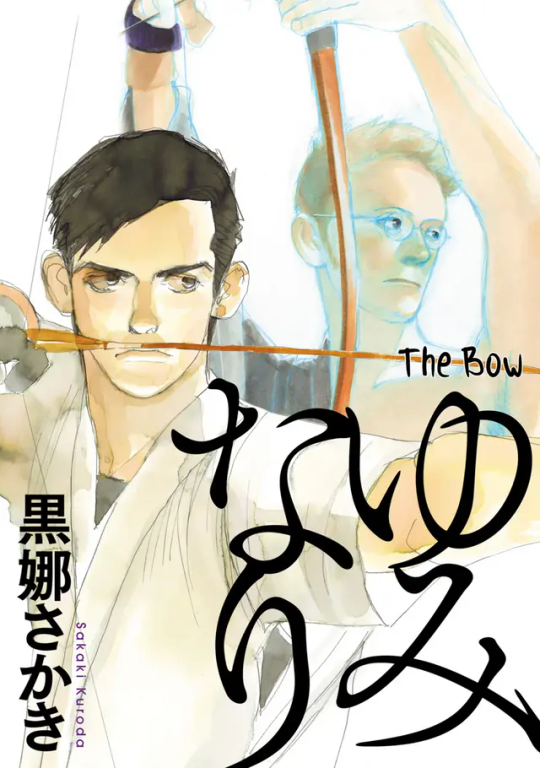
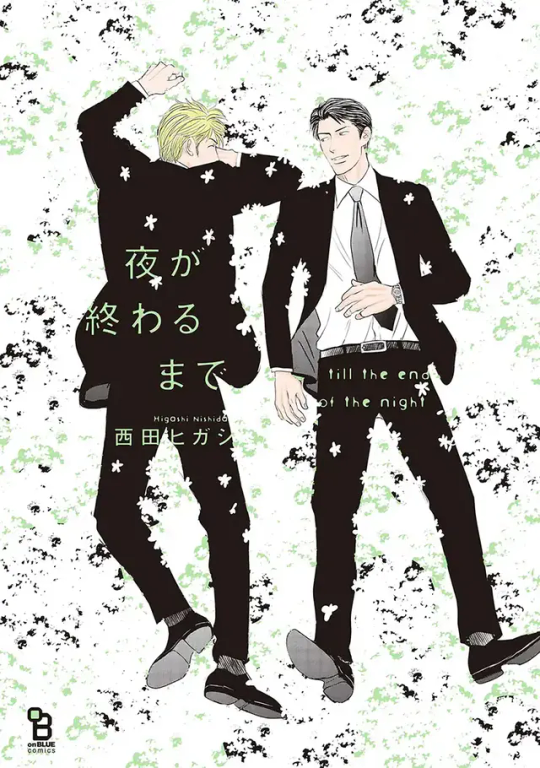
I read Evelyn Waugh's "Brideshead Revisited" at an impressionable time in my life (though I suppose if you are the kind of person to be moved by "Brideshead Revisited"—that is, a person prone to self-indulgent nostalgia—there is no safe time to read it) and thus live with the mark of being the kind of person who has committed to memory passages of a sentimental novel from the 1940s about a British man. Shameful! Let this be a lesson to you: the British will always find us when we are weak.
For those of you unfamiliar, "Brideshead Revisited" is about a rather ordinary middle class young man named Charles Ryder who at Oxford befriends Sebastian Flyte, the charismatic youngest son from a landed gentry family. Sebastian is tortured by a desire to escape the clutches of his family and eventually turns to a squalid life of alcoholism and poverty, much to Charles' confusion and vexation. Charles ends up romantically entangled with Sebastian's sister Julia, who in her own rebellion against her family has married a rather modern and horrible businessman named Rex Motram. In a striking passage during Charles and Julia's reunion, she asks Charles whether he loved Sebastian. "Oh yes," Charles says without hesitation. "He was the forerunner." It is a line that never leaves Julia's mind, and she brings it up later when she and Charles part, never to see each other again.
I am the same—I have never forgotten that line. Waugh did not write Charles and Sebastian explicitly as lovers, but he also did not shy away from the obvious romantic overtones of their friendship. Sebastian's father's mistress calls them out on it, commenting ironically on those too-close "romantic friendships." Charles (in another passage I've committed to memory) talks about how his days at Oxford were a search for love, "that low door in the wall," that was in a way filled by Sebastian. Caring for Sebastian, being at his side and learning there is nothing he could do for him, was how Charles learned about love. It helped, of course, that Sebastian and Julia were siblings. It is always easier, when the forerunner is family too.
(spoilers below, which matters especially if you want to experience the wild ride of "Till the End of the Night" yourself)
In Kuroda Sakaki's "The Bow," Takakura Kyu finds himself living in his father's apartment after his father's death. His downstairs neighbor Hideshima was his father's best friend and also his father's former archery teammate. In search of passion in his life and sick of sleeping around, Kyu takes up Hideshima's offer to learn archery. As he and Kyu get closer through archery, nascent feelings of desire start bubbling up in Hideshima, complicated by the fact that Hideshima had rejected Kyu's father Tetsu when they were younger and that Kyu also finds himself attracted to Hideshima. Hideshima, unable to bring himself to extricate himself from Kyu's advances, sleeps with Kyu, but then breaks things off when he spots Kyu's former sex friend Ei leaving Kyu's apartment in the morning. This and the closing of the archery dojo brings Hideshima and Kyu's relationship to an aborted end, and they disappear from each other's lives, until a year later, Kyu receives an email from Hideshima, announcing the reopening of the dojo, which Hideshima has purchased.
At the risk of accidentally making Hideshima into Jacob from the Twilight series, was loving Tetsu a forerunner for eventually loving Tetsu's son Kyu? Was Hideshima unknowingly preparing himself for the future love of his life, or is he still chasing after Tetsu's afterimage through Kyu? When Hideshima allows himself to be seduced by Kyu, he thinks, "I thought I had feelings for [Kyu] all this time. I've finally realized that I've been chasing after Takakura's shadow." Hideshima sees Tetsu in Kyu's form constantly: in his archery form, in the CD that Kyu fiddles with, in Kyu's feelings for Hideshima. But when they are reunited a year later in the archery dojo, Hideshima puts to rest the idea that he sees Kyu as a replacement for his father. He reassures Kyu that Kyu is his own person, and Hideshima's only apprentice.
It's thrilling enough to love both the father and the son; it is even more thrilling, as I think it is in Hideshima's case, to love both the father and the son and to become a pseudo-father to the son. Apprenticeship is a fatherhood ritual, sometimes literally in the case of craftsmen passing on their school of artistry. Hideshima is not looking to fuck Kyu's father through Kyu; he is looking to be a father figure that Kyu can also fuck. This is compounded by the reveal that Hideshima had moved into a downstairs apartment so that he could help Tetsu raise Kyu, the baby Tetsu had with Chihiro (the third friend of their archery trio and Hideshima's love rival) sometime after Hideshima rejected Tetsu. Hideshima had held Kyu in his arms when Kyu was just an infant. And in his role as archery teacher, he "gives birth" to another version of Kyu. Kyu's shooting form is not like his father's, but Hideshima's.
What Hideshima wants by the end of "The Bow" is not quite love, but connection (very archery master of him), something bigger than his own body, something that will land outside of himself, that is formed by himself but ends elsewhere, maybe even inside someone else (again, very archery master of him). When Kyu was first born, Tetsu told Kyu that humans can only find joy in other living things (very new papa of him). What he meant was a child, a wife, a partner. But in the end what Hideshima builds is a way to Kyu through archery. Even if Kyu and him separate, Kyu's shooting form will always be that of Hideshima's.
Is that love? Well, we are in the business of boys love, and not bows love (I will never stop making variations on this joke). So it must be.
The forerunner trope usually works like this: A is dead and B is sad about it. C is a brother, son, cousin, some other substitute for A. In his grief, B mistakes C for A. B eventually learns to love C on his own terms. In "Till the End of the Night," Hiura finds himself the lead prosecutor on a case involving the potential murder of his colleague and law school classmate Kageyama. He is haunted every night by dreams in which he and Kageyama have sex, a fantastical scene that disturbs Hiura because, while Hiura has always known Kageyama was gay, their friendship remained strictly platonic. While investigating the whereabouts of Kageyama's body, Hiura confronts Kageyama's younger brother Naoto, who bears a troubling resemblance to Kageyama and an inexplicable hostility towards Hiura.
Kageyama loved Hiura, of course he did; Naoto reveals that Kageyama slept exclusively with men who physically resembled Hiura, a fact that only serves to make Hiura sentimental over Kageyama, crying as he explains to Naoto, "I miss him. If he wanted me, he should have tried." As for Naoto, he was never close to Kageyama, and in fact no one but Hiura seems to see how much Naoto resembles his dead brother. Naoto, then, is a ghost of Kageyama that only Hiura seems to see. It is no surprise that as hope of finding Kageyama alive wanes, Naoto and Hiura are bound more and more closely together, eventually culminating in them having sex.
Here you might think you know where the story will go next. They find Kageyama's body. Naoto has some personal admission of vulnerability or feeling; perhaps he loved his brother after all, and his resentment towards Hiura was a misplacement of his grief. Perhaps it is Hiura who breaks down, and Naoto must hold him as they cry over Kageyama's death together. They have sex again; perhaps then they separate, thinking they cannot conduct a relationship so shadowed by the specter of Kageyama's death. Then, maybe, Hiura is walking down the street, and he catches a glance of someone familiar. He calls out. It is Naoto's name on his lips, not Kageyama's. The man turns around: it is neither of them. But that is enough for Hiura to realize what he does next.
Well, trust that Nishida Higashi will never go the conventional route and turn the trope on its head. What actually happens is that Kageyama turns out to have been alive the whole time, kidnapped by a woman who had a mental breakdown after her son died. Hiura is led by Kageyama's disembodied voice to the location where the woman has dumped an unconscious Kageyama and saves Kageyama from a near certain drowning death. Kageyama wakes up to find Hiura at his bedside. Hiura cries. The story ends. They do not have sex (not even in the bonus chapter), and Naoto never shows up again.
"Till the End of the Night" feels like a ghost story that is unable to fully commit to Kageyama's death. Nishida slips in little implications that Naoto only assumes his resemblance to the older Kageyama brother after Kageyama is almost killed, as if he is possessed by Kageyama; Naoto had longer hair, for example, but cut it after Kageyama's disappearance, and professes that he doesn't remember the night that he and Hiura had sex. Hiura, too, is convinced that he interacts at time with Kageyama and at times with Naoto. But if Kageyama was not dead, not even a coma, what possesses Naoto? Are souls in Nishida's world so easily dislodged? And if Naoto is merely a channel for Kageyama, why does Nishida spend so much time with Naoto berating Kageyama's life choices to Hiura's face? Why have Hiura and Naoto engage in any physical sex at all, when, rather memorably, there is a scene where Kageyama's ghost appears to embody a river that then goes on to sexually assault Hiura?
Nishida's theme is of regrets, of course: two people who failed to see each other for a time and thus missed the chance for connection, until a near death experience brings them to honesty. By using Naoto, Kageyama is able to give voice to the dirty side of his that he has hidden from Hiura all this time, and to be accepted by Hiura despite Hiura seeing the whole ugly truth. Whether Hiura could have any other response but acceptance, when he believed the alternative is accepting Kageyama's death, is a question for another time. Kageyama is a forerunner whose competitive spirit is too powerful to disappear politely into the sunset, like Takakura Tetsu. Or, alternatively, Hiura's desire to have a second chance with Kageyama is so strong it manifests in a perfect stranger and forces Naoto to be a passenger in his own body. No forerunner for him; he wants the original, and he wants it alive. Now that, I think, is truly boys love.
We never hear Sebastian's side of the story in "Brideshead Revisited." Charles goes on to marry one woman and attempt to marry Julia; Sebastian, as far as the novel is concerned, never sleeps with any women and ends up shacking up with a German man named Kurt who treats Sebastian like a dog. If Sebastian loved Charles, we'll never know. Waugh would probably say no, that Sebastian wasn't capable of it, but he was trying to write a story about days of sloth and excess eventually bringing Charles to the Catholic church, so giving voice to Sebastian's tragic love for Charles would be rather antithetical to his aims.
In "The Bow" and "Till the End of the Night," too, the forerunner/substitute's side of the story is pushed to one side. Naoto unceremoniously disappears from "Till the End of the Night" with a phone call. We don't even see his face, as if to emphasize that he was only in this story to look like Kageyama at a time when Hiura was vulnerable to such a thing. I wonder if Hiura will ever tell Kageyama about sleeping with his brother's body; my bets are on "no." As for the characters in "The Bow," I understand why Hideshima might not have responded to Tetsu when they were younger, but what happened in the time after Chihiro died, when Tetsu was a single dad and Hideshima was living under him? Kyu thought his father took advantage of Hideshima's feelings, but I rather think it was the other way around. Tetsu was waiting, biding his time, hoping Hideshima would see that they were meant to be together. Tetsu chose to raise Kyu all alone and asked Hideshima to hold his newborn son because, I think, he was hoping Hideshima would raise Kyu with him and be Kyu's father too. Even after Kyu presumably grew up and left his father's house, Tetsu and Hideshima remained upstairs and downstairs neighbors, close enough to hear each other's footsteps.
But a forerunner is always ahead of his time. He exists to become instrumentalized in the pursuit of true love. His only role is to usher in The Love Story: Tetsu by giving birth to Kyu, or Naoto by giving his body over to his brother. His love comes too early and remains unfilled and dies as Sebastian did, in a sunny garden among Franciscan monks, assumed to be happy because otherwise we feel bad. The true love narrative will always bulldoze through anything that shows the slightest hesitation, and the forerunner is the sacrifice that paves the way.
You can read both "The Bow" and "Till the End of the Night" on Manga Planet (formerly Futekiya).
0 notes
Text
SINCE I COULD DIE TOMORROW—FINITUDE IN PRESENCE OF LIFE
This is a post I previously published for a very short period of time and then deleted. I decided to publish it permanently after thinking about vulnerability and Sumako Kari, but having no backup, I had to rewrite it as I remember it. So here I am, rambling once again about Since I Could Die Tomorrow by Sumako Kari. There will be mentions of death and terminal illness here and there, and lots of…
#nora aaaaaa#much love to this post which is full of interiority and vulnerability#it is so difficult to be alive in this world#we have only our bodies and our bodies will betray us#there is nothing we can do about that except wait for the betrayal to come#all acts of human connection are breakwaters meant to stave that off#it is hard to build them and they will crumble#and the only true thing in this world is helping build them for yourself and for others
3 notes
·
View notes
Note
If you don't mind and have the time, can I send you BL challenge questions? Thx
You are always welcome to send me questions! However, I have to note that I am criminally bad at answering any questions that are structured like "What are your top [x] favorite [y]?" in part because I have a memory like a sieve and have to do a lot of soul-searching to remind myself of things I've read (I promise I'm working on a private tracker that will help me with this) and also because I just don't have very strong "tier" feelings. I appreciate so many things but all for different reasons! So if I don't answer, it's often because I'm struggling to come up with a satisfying answer. It may take me weeks; it may even take me months, but I am thinking.
However, please don't take this to mean that I don't want your questions! And if you are interested in dropping me recommendations or just want to talk about a series I've/you've read, please do!
(Side note: I'm sorry to the handful of people who have been sending me kind messages about how much you've enjoyed reading my posts. I've seen them! Thank you for sending me them! I very much want to send replies but I Have A Problem with publicly sharing nice things people say about me and if you're anon, that is the only way to acknowledge receipt... so please know I saw your messages and I appreciate them!!)
1 note
·
View note
Link
#perfect review for a perfect series#i wish i had known earlier that it was licensed bc i would have recced it everywhere
4 notes
·
View notes
Text
MIDNIGHT RAIN & ONE ROOM ANGEL—IN PRAISE OF PATHETIC (FICTIONAL) MEN
As some of you may have seen on my Twitter, I felt the pull to reread CTK‘s Midnight Rain and wanted to follow that with Harada‘s One Room Angel somehow. It was subconsciously done but in hindsight, my brain was onto something. So I wanted to hijack some of your spare time and attention span for a couple of minutes to talk about the main characters of these two series, Midnight Rain‘s Ethan and…
2 notes
·
View notes
Text
14/50: the tortured mangaka department (kari sumako, "lying devil")
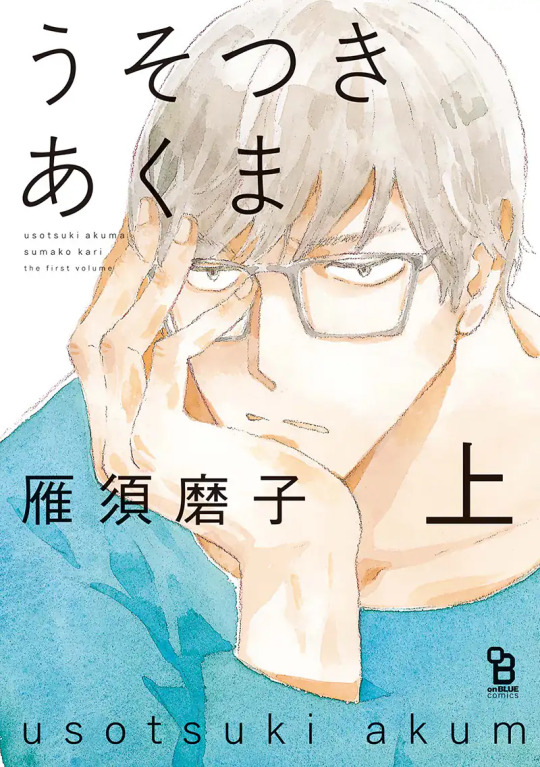
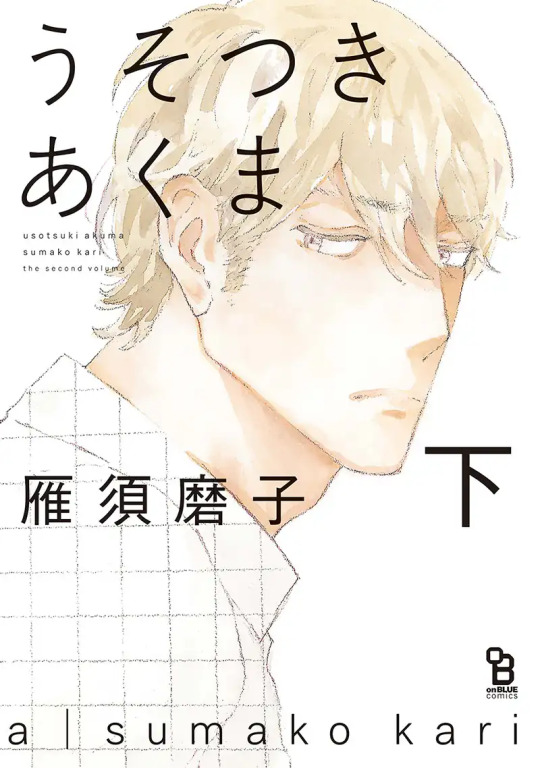
In the spectrum of love-hate stories, there is nothing for me that can top a story between two authors or artists. In other versions of this trope (e.g. rival salesmen, delinquents from opposing gangs, classmates competing for rank, aces on opposite sports teams), the rivalry is the starting place. The characters are filled with resentment, jealousy, irritation. This is the activation energy necessary to generate the romance; after all, the opposite of love is not hate, etc. If there is admiration for the craft (and there often is, like in the case of 10 Dance), it is a begrudging one. The other is your competitor. You appreciate them from the vantage of point of putting yourself in their position and wanting to be them. "If only I could do that." "You make me want to do that." Love, in this case, helps the characters make peace with their messy feelings and put aside their egos. Love smooths over, love overcomes.
Not all stories about two rivals are love stories. But all stories about two writers who like each other's work is, ultimately, a love-hate story. Because there is no greater praise one writer can give another writer than, "I fucking hate you." When a writer reads another writer's work and loves it, he momentarily loses his identity as a writer—he becomes a reader, an object to be guided and seduced and manipulated by the other. He is compromised, he is made vulnerable. His appreciation forces him to surrender. To submit to this, over and over again, is a story that starts with love and becomes hate, before wrapping right back around again.
So this week, let's talk about Kari Sumako's "Lying Devil."
"Lying Devil" opens on Amari Eiichi, a mangaka who in his younger days was an assistant to (and mega fan of) fellow mangaka Ugo Satoru. Five years ago, Ugo had broken off their nascent relationship when Amari debuted to much acclaim, citing his inability to be truly happy for or praise Amari's work without being overwhelmed with professional jealousy. Despite this, years later, Amari and Ugo are still carrying on a strained fuckbuddy relationship that Amari finds unsatisfying and Ugo finds overwhelming. They carry on this way, on parallel paths that rarely intersect except for athletic late night sex and prickly but strangely intimate phone calls, until Ugo's poorly planned attempt at making Amari jealous (in part by going mountain climbing with another mangaka named Yara Shu whose presence in this story is so odd that I wondered for a while if he was a cultural reference I'd missed) backfires and causes Amari to dump Ugo himself and go fishing for a new boyfriend. It doesn't work—after throwing a drunken tantrum, Amari finds himself going back to Ugo, who has begun spiraling into a black hole of depression and writer's block that Amari tries valiantly to help him out of. That doesn't work either—despite Amari's best attempts to bind Ugo to him, Ugo ends up physically and artistically withdrawing, finally leaving his apartment, manga career, and Amari and disappearing into the night.
In other love stories, the resentment is a bug; in Amari and Ugo, it is a feature. Their happy ending is to stay in this push-pull of love-hate, to be drawn in by the other's talent only for that talent to stab them in the heart. A lesser writer than Kari might have acquiesced to the temptation dangled by chapter 11, when Amari helps midwife Ugo's struggling series through writer's block, to come up with a neater happy ending for these two. Perhaps instead of Ugo showing up at Amari's door four years later with a self-published collection of oneshots, they should have written a manga together or made up a new name under which they could together publish original doujinshi. After all, Ugo won his first award by taking story ideas from his good friend Chiba, who gladly handed over his story ideas to Ugo because he believed he'd never be a mangaka himself.
But Ugo and Amari are Kari Sumako's creations, and in all three of her three bl works on Futekiya, she features characters who hold strong to their principles, no matter how miserable it might make them, even if it loses them everything. What drew Amari and Ugo to each other was the desire to see each other and be recognized, in their work as well as in their feelings. Amari was a fan of the work Ugo made before they met. He is, and always will remain, a fan of Ugo's work. To strip away Ugo's ability to make work that is wholly and unapologetically himself, even if it is in service of something good that was created with Amari's assistance, is tantamount to creative "unaliving." It is no kindness for Ugo to be told that with Amari helping him, his work was "great" and "unexpected" and imbued with new feeling. "My god," he thinks, ruing over the impending marriage of another mangaka friend and this "marriage" of his and Amari's art. He must escape this—in their union they have both become smaller, lesser people, or at least smaller, lesser creators. And he is right, for once they are separated, Amari writes the most successful story of his career, and Ugo is finally able to draw again.
This is not a healthy way to think about writing, of course. To live with jealousy so ruinous that it eats away your life and makes you abandon your apartment, manga serialization, and fuck-buddy-ex-boyfriend for four years is, obviously, the mark of someone who maybe needs to stop drawing manga for a bit and/or go to therapy, and is certainly a red flag when it comes to pursuing a romantic relationship. In the afterward, Kari states that "Amari would be happier if [he and Ugo] broke up," only to be visited by a doodle of Amari who, threatening her with a kitchen knife, forces her to recant. Well, while Kari must answer to her own creations, I don't: she was right and should say so. Amari would have been happier if he and Ugo had split up and stayed split up.
I joked (I was being serious) in my post on Marukido Maki's "Pornographer" that all writers are infested with inherent badness. Certainly Ugo more than proves the rule. He is high-handed, overbearing, controlling and dismissive of Amari all at once, a bad friend and an even worse boyfriend. He wants Amari at his beck and call, because it proves that Amari loves him and would do anything for him. He knows Amari loves him and wants sex from him, but treats their time together like meditation or time at the gym or, worse, a trip to the restroom: something that helps reset his rhythm, but nothing sacred or special. Perhaps he has to treat Amari this way, because it tricks his mind into forgetting, for just a second, that Amari is sacred and special—not because of Amari's feelings for Ugo, but because of Amari's talent at manga, which tortures Ugo so much that he cannot even bear to read Amari's manga, not even a single glance.
What Amari deserves is supportive friends, editors, and fans, who would all appreciate Amari's ability to transmute feelings into storyboards and celebrate his determination to meet, even exceed, deadlines. Amari is so humble, so forgiving, so generous. He is even handsome. Inspiration and art come easily to him; he either thinks nothing of his talent or nothing of talent at all. He has so much talent he is even able to share it with Ugo, when Ugo is at his lowest. It is right that Ugo should grovel at the end, dogezaing in the entryway of Amari's entryway just to be allowed the privilege to see Amari again.
But my god! Doesn't that eat away at you? Don't you get why it might have eaten away at Ugo? Why doesn't Amari ever suffer for his art? Why is it so easy for him to create manga? Why does Amari never get jealous of Ugo's work? Why are all his hangups only about Ugo as the lover, Ugo the boyfriend, and never Ugo the mangaka? Is it that he isn't threatened by Ugo's work, and that's why he is able to read Ugo's work without feeling a stabbing in his heart, sometimes a stabbing all over, the furious desire to rip the pages to shreds and then eat them, because maybe in doing so you can totally crush the existence of this other person who is imbued with the talent you so fervently desire while also bringing that talent into your own body?
Isn't it more normal to think this way, to fall into Ugo's orbit of insecurities and jealousy?
Or is me saying all this just telling on myself?
The first time I read "Lying Devil," I was angry on Amari's behalf. "This fucking bastard!" I chanted along with Amari. "This scum of the earth! This coward!" The second and third time I read "Lying Devil," I thought to myself, it is Amari who is the monstrous one. A good man who is able to write so much so easily is not a normal man. He was put on this earth as a trial for Ugo, and for people like me, who are like Ugo. There are so many more of us who are like Ugo and not like Amari, who struggle with our own inadequacies, who face down a blank page and run away. Like Kathryn Chetkovich who writes in her autobiographical-ish essay "Envy" about dating a struggling novelist who ends up being Jonathan Franzen. In her essay, she remembers remembering a passage of his, then goes to find the piece he wrote, and realizes, "It wasn't as good as I remembered. It was better." Even her memory's recreation of his prose pales in comparison to his actual prose. That is Ugo-core.
Even "Look Back," which at first glance seems to be the opposite of "Lying Devil" with two main characters who work together to make manga and encounter tragedy when they are apart, is more Ugo-core than Amari-core. It is her jealousy and the drive to create something that is wholly herself that inspires Fujino to make manga. The drive to be "superior" in some way to Kyomoto even inspires Fujino to lie: that she quit manga so that she can submit a one-shot to a magazine contest. This drive, this lie, connects the two parallel worlds of the story: karate-athlete Fujino also lies to Kyomoto that she is thinking of writing a manga. Some writers, I’m sure, are inspired purely by the desire to put art out in the world. But how many more of us do so to prove a point, that we are in some ways superior to someone, and specifically the good writer whose story incapacitated us, reduced us to simply readers, held captive in the giant hands of a worthier talent, pathetic and cute and small?
The fourth time I read "Lying Devil," with all this swirling in my head, I found myself going back to the second chapter, to the scene where Ugo drags Amari to a drinking party with their other mangaka friends after they've had sex. Ugo, half-asleep on Chiba's knee, suddenly calls out Amari's name, and Amari responds immediately. Draw me a scene of Ikebukuro from a high-angle aerial shot, Ugo continues, as if lost in time and dreaming about when Amari used to be his assistant, much to the amusement of everyone around them. Amari goes home happy. "At that moment," he says, "Ugo was awake. He woke up, covered up what he had let slip, then fell back asleep."
The first time I read this scene, I had taken Amari—and thus Kari Sumako—at his word. The second time, I began to doubt. The third and fourth time, I wondered if maybe Ugo had called out Amari's name, just to test Amari, just to see if Amari would respond immediately. And when Amari called out "yes" like a reflex, like his body would always respond to Ugo wanting him, no matter the time or place, he'd hated the small petty part of himself that needed to test Amari, hated the fact that this was the only way he could show Amari that even in a group of their peers, even with Amari at the top of his career, Ugo can still bring him down like this, to the lowly assistant who will always respond to Ugo calling for his help. And it would never occur to Amari to think of any of this, Amari, ever the romantic. Of course Amari would only see the good. Of course Ugo could never bring himself to admit the bad. How clever of Kari to test us with this scene so early in the story, before we've even gotten to fully know Ugo. How sharp the writing, how perfectly characterized.
And then I thought to myself, goddamn you, Kari Sumako. I fucking hate you.
You can read "Lying Devil" on Manga Planet.
6 notes
·
View notes
Text
13/50: you got a childhood friend or lover in me ("try & i love you," "derail," and "love song of the cracker ball")
Sometimes when you don't like a trope you end up devoting your entire week reading Futekiya's back catalogue of the trope and come up for air on a Sunday realizing you should probably say something about it. So, let's talk about childhood friends to lovers.
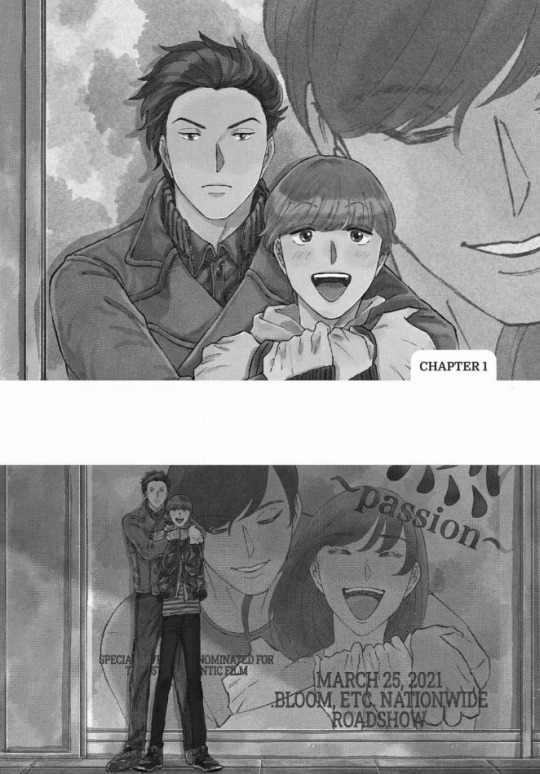
The splash page of the first chapter of echo's "Try & I Love You" features main characters Ren and Takumi imitating the poster art of a romantic movie they later go on to watch on their first date. This is the movie Takumi convinces them to pick it over Ren's suggestion (some sort of MCU parody) because "if we don't watch something like this, we won't feel the love, right?" The movie is a disaster; they both are so dissatisfied that they end up going to see Ren's pick immediately after. Worried that they've slipped back into friend territory, Takumi and Ren hold hands ("Friends don't do that, do they?") only to realize that friends, in fact, do hold hands, or at least they did, as friends, when they were younger. What else, then, could they do to differentiate themselves from the mere friends they used to be? Hugging, hobbies, hanging out, compatibility—these are all shared by the "lesser" couplings of friends or fuck-buddies. So, Takumi concludes, it must be sex after all. Or is it?
I was not blown away by "Try & I Love You," but I very much appreciate its existence. Unlike many other iterations of the "childhood friends to lovers" storyline (some of which I'll discuss later), it is the rare, unadulterated version of this trope: two childhood friends who harbor no romantic interest in each other before they decide in a moment of "why not?" to date each other. Accordingly, the plot consists entirely of Takumi and Ren struggling with what dating means for their friendship, if it means anything at all. In chapter 2, Takumi complains to his coworker that "it doesn't feel like we're lovers at all." They are too comfortable with each other and know each other too well. Instead of going out, they rent a bunch of movies and watched them at home. Instead of a popular cafe, they go to an all-you-can-eat-crabs buffet. They cuddle and make miso soup for each other after a night of drinking and go to a gyoza festival where they feed each other and even though Takumi's heart pounds at seeing Ren's happy face, he still wonders, "What if I tell Ren I want to date like real couples?" What the hell are you talking about, the reader may be yelling at this point. Are you not already dating like a real couple?
This week I was chatting about relationships and heteronormativity with my good friend Caitlin, who always has something smart to say. She reminded me that part of rebuking heteronormativity is "figuring out who you are versus what you think you are based on stories." In the case of "Try", the stories are contained in things like the movie Takumi and Ren imitated in chapter one, a romanticized fantasy narrative about how love should be performed and how dating should feel. Love feels like butterflies in the stomach, demands certain date spots and behaviors, and most importantly should not be comfortable during the honeymoon period. It should include some sort of physical manifestation of sexuality, because in these stories, you have sex with one person and that one person is the partner you date exclusively. These stories are predictable and iterative patterns of behavior that, for many people and for Takumi and Ren, make us doubt love even when we are staring it in the face.
In our society and in Takumi and Ren's, these stories are also straight ones, the heterosexual part of heteronormative. Ren's ex-girlfriend Sayaka breaks up with him because she realized she is attracted to women, and in the aftermath, Ren realizes he was distracted by years of heterosexuality into thinking that his feelings for Takumi cannot be the same romantic feelings he has for Sayaka, simply because Sayaka is a woman and Takumi is not. Later, when Takumi misunderstands Ren's motivations for dating him, Ren comes to a second discovery, even more radical than the first: that the issue is not whether Sayaka is a woman or that Takumi is a man, but that Ren wants to stay with Takumi, even if it means chasing and begging and fighting for a chance.
If love is anything at all, echo argues, it's not in sex or kissing or holding hands. At its most basic core, it must reside in the desire to be with the other person. For Sayaka was similar to Takumi in the ways that attracted her to Ren: they have fun together, they like the same things. But Ren was willing to give up Sayaka, simply because she said she loves women. And Ren wanted to date Takumi, even if Takumi never expressed an interest in men.
There is something dangerously close to aromanticism in Takumi, and part of me thinks echo could have gone the full nine yards with that. "Up until now, I've never been in a relationship because I fell in love with them," Ren admits to Takumi. Later, he explains, "I think girls are cute, but I've noticed that I don't want to know more about them, nor do I have romantic feelings for them. I don't feel anything in particular when I see my fellow men, either." But here echo stops short, and creates a unique "gay for you" twist but for alloromanticism: Ren's feelings for Takumi are uniquely romantic and inspire him to want to be with Takumi. And that's fine; we are in the boys love genre after all. But after the confession, "Try" loses its odd appeal and becomes a kind of awkward sex romp, with Ren getting angry that Takumi is trying to practice anal sex on his own and an epilogue where it turns out that Takumi is actually an insatiable beast over, of all things, Ren's sleeping face. I can't help but wonder what, say, ymz would have done with Takumi and Ren's relationship—but, well, "Good-bye, Heron" already exists.
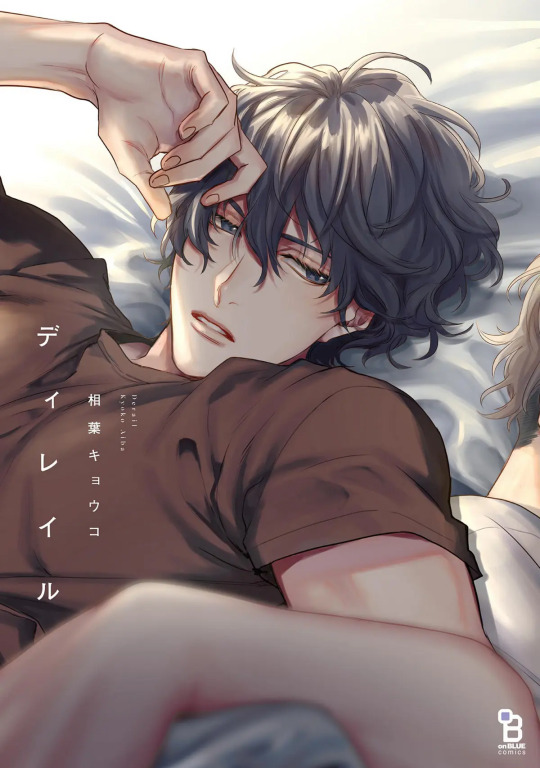
On the other hand, Aiba Kyoko's "Derail" is "childhood friends to lovers" by way of false advertising. Hikaru and Haru are not childhood "friends" at all, but rather two lovers who have used childhood friends as a front to hide behind. Haru is a gloomy playboy who has spent most of his life devising ways to keep Hikaru unreasonably close to him, and Hikaru is a classic maladjusted people pleaser who uses his nice guy persona to hide the fact that he derives almost all his self-worth from being wanted by Haru. Both of them have the makings of psychopaths in another story, but here they spend their energy playing tortuous mindgames in their own heads while from the outside they progress, totally normally, from friends to dating to lovers. That neither of them have any real friends other than each other becomes increasingly obvious, because any third party would have called out this relationship for what it is from the start. Oh, your childhood best friend sleeps with you in the same bed and forbids you from bringing girls home? Oh, your childhood best friend makes googly eyes at you over breakfast and lets you jerk him off? Come on, man. Be so fucking real with me right now.
The issue is, of course, that the default assumption of heterosexuality has Haru believing he needs to be playing some sort of Soulslike game with Hikaru's feelings before he can get to his goal of dating, while Hikaru believes he's unilaterally trapped Haru like a codependent spider in a web of neediness. As Haru says, when people in tense situations are pressured to pick between two unreasonable choices, they're convinced they must choose one of them. So if you are two men who want to be in each other's lives forever and to be each other's number one, heteronormativity has you believing the unreasonable choices are either to (1) not do that, which isn't an option, or (2) slide everything under the cover of "childhood friends" and hope no one, least of all yourselves, takes a closer look. This is a losing proposition, but Hikaru and Haru are so busy believing the story they tell themselves and everyone around them of being "childhood friends" that they simply cannot realize they are in an impossible situation, being forced to make unreasonable choices. They must, as one might say, find the secret third thing, which is not so secret here: just admit you love each other and leave the rest of us alone!
Unlike Takumi and Ren, I don't think Hikaru and Haru were ever friends or at least haven't been friends for a long time, too caught up as they were in stretching the boundaries of acceptable "childhood friends" behavior. And I think there's a part of their creator that agrees with me. Amusingly and in contrast with "Try," the epilogue of "Derail" features the two of them going to a hotel for a date, not to have sex, but rather to spend an evening playing video games and relaxing. This might be the closest we ever get to a "lovers to childhood friends" reverse trope, or at least as close as we'll ever get without reincarnation or isekai.
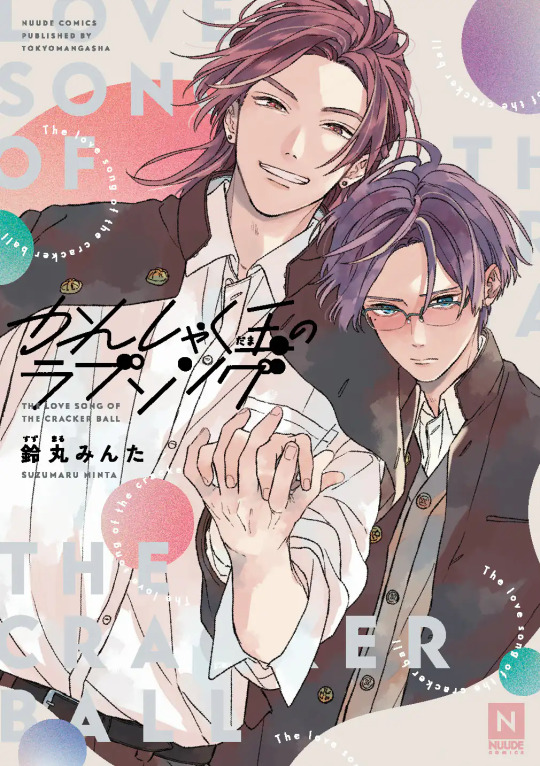
Suzumaru Minta's "Love Song of the Cracker Ball" splits the difference by featuring one character who is learning how to turn a hypothetical openness to the other gender into a very real interest in one specific male friend and another character who is doing his own one-man show of "Derail" but, like, more normal about it. Wako and Takeo have been neighbors and childhood friends for a very long time, and Wako had been depending on remaining Takeo's friend to stay Takeo's number one. When that position is threatened by Takeo suddenly musing that he'd be open to dating a guy, Wako loses equilibrium entirely and ends up confessing his long-time crush to Takeo, who of course suggests they try dating. Wako is somehow even less prepared for this possibility than he was for getting rejected, but after a lot of hand-holding and hijinks and a poorly thought out plan by Wako to figure out what inspired Takeo's gay awakening, they manage to make a proper relationship of it.
(Before we get further in this review, can I just say that I loved this story? Wako and Takeo's friendship feels so lived-in, where you can tell they are two characters with a past who are used to dealing with each other, with Takeo able to pinpoint even Wako's wildest insecurities and Wako never letting Takeo control the pace, even when, towards the end of the story, it threatens to destroy their burgeoning relationship. Suzumaru draws big, dynamic expressions for her characters that bring them to life, making even frail Wako feel explosive, and isn't afraid of making her characters not look handsome if it serves the comedic timing. In particular, I love the panel at the end of chapter 1 when Wako yells "good fucking job!" Wako's face is ugly from the exertion of screaming, and Takeo literally looks like he could fall off the rooftop stairs and into a Crayon Shin-Chan panel. Wako and Takeo's friend Manaka is my favorite side character and would deserve his own spinoff if he wasn't imbued with the pansexual appeal of a certified pretty boy. He does a surprisingly good job playing emotional referee, and it speaks to the strength of their friendship that he never once seems worried that his friends will stop needing him after they start dating each other.)
"Cracker Ball" is a spin-off of "Cupid is Struck by Lightning," and while it isn't necessary to read "Cupid" to enjoy "Cracker Ball," Takeo and the decisions he makes make a lot more sense when you have. In "Cupid," Takeo is a side character who is brought into volume two to add spice and intrigue to main characters Ao and Shingo's relationship. Arrogant, brash, and determined to teach his underclassman a lesson, Takeo comes out the other side of "Cupid" realizing that he wants what Ao and Shingo have: a love so important that you'd be willing to be retraumatized just to prove that you need and want to be the other person. That's why he's so upset at what initially looks like Wako being homophobic, only to be totally disarmed when Wako declares, "I am the one who loves you the most." "Cracker Ball" softens the blustering egocentric Takeo we see in "Cupid" (though that may be because "Cracker Ball" is partially through the POV of Wako, for whom there can be no better man than Takeo), but the animating drive of Takeo is still to be someone's number one. When the veil of heterosexuality is lifted, he realizes he's had that all along in Wako.
Takeo is the most straightforward of the six men we see in these three series. Unbeholden to shame or crippling anxiety, he ends up cutting right to the bone of the childhood friends trope. When he corners Wako in chapter 2, he doesn't mince words and poses the questions that all friends-to-lovers pairs must answer. What can you do when you are already family, when there is already a bond that cannot break? What is beyond that, and why is it worth reaching for? "Childhood friends to lovers" is so powerful because it is a story that asks the characters to risk so much. It is a story that believes being together is worth potentially altering something that already works, because that is the only way to together explore something that may not. It is about moving into that uncertain future together, with a person both familiar and strange by your side. It is a man you have known all your life, but suddenly, he looks different. He is on the other side of a line, and that line is love. But he holds out his hand, and when you grab it, you see him for who he is. "See?" he says. "There is nothing to be scared of."
You can read all three series on Futekiya.
7 notes
·
View notes
Text
12/50: second draft (marukido maki, "pornographer" series)
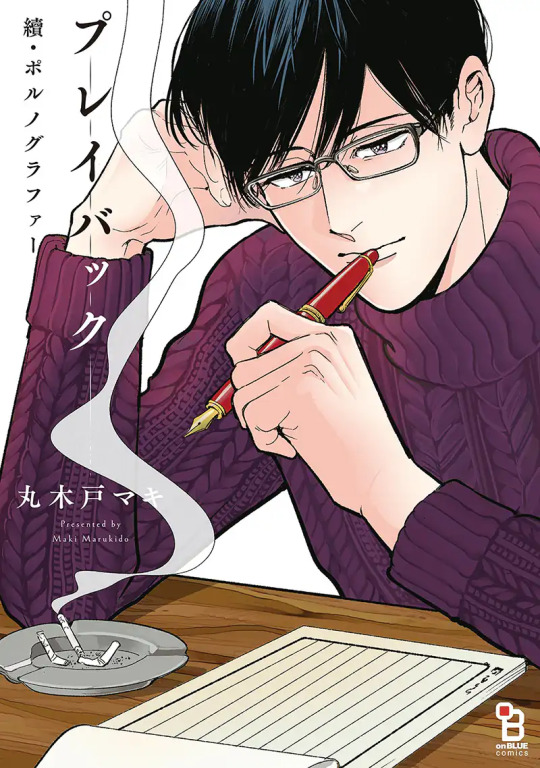
Before falling back into bl fandom (thanks for nothing, June!), I was watching a lot of videos about conscious consumerism and booktok fandom. For a while, despite being hobby-less, I found myself contemplating how more and more modern hobbies have more and more become about consuming, buying, purchasing, collecting ever more things. Even reading has become a hobby about consumption rather than contemplation or meditation. In the loudest, most obvious corners of "reading as fandom," if reading is that, the hobby is defined by book hauls, buying new releases, subscription boxes, exclusive editions—the hallmarks of buying as a hobby rather than doing.
How do we make reading a hobby that isn't about spending money, and how, specifically, do we do this in the context of bl manga? I think it feels even more potent in bl manga because we the readers feel it is our obligation to support it, and more importantly, that our support allows the hobby to continue and proliferate. For example, we believe (and I am not saying we are wrong to do so) that if we buy more licensed bl and support reading/buying bl on their official platforms, the companies will keep licensing new series and even bring us the specific series we want. Too, as the hobby becomes more normalized, we encounter new and different (and, sometimes, bad) ways of doing fandom, like sharing screenshots of scanlations while tagging the authors. Faced with bad behaviors and bad actors, we try to rehabilitate our image, convince people that we are serious, we are a force to be reckoned with, that we matter. And how do we do that in this current world, if not through money?
But I bring these questions to you not to answer them, but to disregard them. As a consumer, as a reader, as a hobbyist, I don't have the responsibility, and certainly not the ability or the know-how, to fix the problems with the industry. I think of myself instead like an ancient wine priestess: mystic and superfluous, responsible not for portents or prescriptions, but rather for doling out the simple pleasures of the present. Others may come with solutions; I, for one, prefer to spend my time talking about bl delusions.
This is of course why I feel so strongly about writing about bl, and doing so in a serious way. It keeps the hobby fresh, forces me to revisit the things I have already bought, and to bring them alive in a way that isn't about buying more things. Rereading, sometimes over a period of years, coming back to stories as a changed person and discovering new reasons to love them—these are ways that I already interact with non-bl anime and manga, that feel normal and even laudatory as I've gotten older. I want to make that a way of interacting with bl too, that the bl stories we read are capable of having the same kind of lasting power, the same kind of emotion.
And so, this week, I want to talk about Marukido Maki's "Pornographer" series, a story about writing that I have read and reread many times.
In 2020 I got a Futekiya sub simply so I could read "Pornographer" and even wrote a little blurb about it. Normally, this would mean that I would consider this series off limits for another long post. After all, what more can I say that I haven't said already? I stand behind every word of my first pass. Kijima is a deliciously bad man who seems designed by Marukido specifically to torture Kuzumi, an innocent himbo with a very rich inner life. That Kijima manages to snag Kuzumi and keep him through the end of "Pornographer" speaks not to Kijima's virtues but rather to the suspension bridge effect of it all. Caught up in Kijima's elaborate lies and then very dramatic reveal of his lies, then strung along for two years while Kijima tries to find himself and a way out of his writer's block, Kuzumi really had only two options: strangle Kijima himself or fall in love with him, and the genre isn't called "boys' ligature."
If there is one fault with "Pornographer" and "Playback," it is that Kuzumi's interiority is not as well-developed as Kijima's, despite being the POV voice in "Pornographer." But perhaps that is because Kuzumi is so normal. It is normal to fall for the seductive, flirtatious older person who talks to you about your erection, it is normal to be upset that he lied to you for months and then ran away after a night of impassioned sex and seven orgasms, it is extremely normal to be furious when he then tries to recreate your meet-cute with another man. What is less obvious, maybe, is what keeps Kuzumi in love with Kijima. This time, in 2025, as I reread the series and especially "Playback," I think what he was drawn to was Kijima's natural loneliness. Kuzumi himself wasn't able to articulate this until chapter 3 of "Playback," when, passed out and lightly concussed from falling down a flight of stairs, he remembers the moment he started falling in love with Kijima. He had been washing Kijima's hair and talking about his parents eventually replacing a beloved family pet who had died of old age. Kijima implies that Kuzumi's family had gotten a new dog because Kuzumi had moved to Tokyo. "If I were your parents, I'd probably be sad too. I'm sure their home without you there was very quiet and lonely."
Kuzumi may not realize it, but in that concussed montage of the moment he began falling in love with Kijima, thinking of Kijima talking about loneliness, Kuzumi has finally seen Kijima as a writer. Writers are inherently lonely people. To write, or at least to want to write, is to be separated in some way from the normal flow of life, to be an observer even in your own life. Like all sentimental writers (myself included), Kijima has a bad habit of being nostalgic for something he has not yet lost. He is unable to be in the moment and enjoy Kuzumi washing his hair without thinking of himself becoming Kuzumi's parents, eventually left with a quiet and lonely home, having allowed Kuzumi to walk out of his life. Perhaps he thought of himself like Kuzumi's dog: helpless, fading, able to enjoy Kuzumi's kind ministrations only because it is temporary. Even at the very end of the series, when in "Spring Life Part 2" Kijima agrees to move in with Kuzumi, Kijima is unable to do so without thinking of endings. "Don't get sick of me and toss me out on the streets," he says, to a man who has had more than enough reasons to do just that and has resisted the impulse each time.
At this height of happiness, about to cohabitate with a man who loves him so much, Kijima remains tortured by happiness as a phase that will pass, of happiness that speaks to the possibility of future loneliness. And this is what inspires him to get out of bed, a bed he is sharing with a man who loves him so, so much, so that he can write. There is no panel that speaks more purely to Kijima's nature than the last page of "Spring Life Part 2." He sits, solitary, at the dining table in the dead of night, smoking. He is separated from the man who loves him by a door, a door that man has shut on purpose. It is because that man loves Kijima so, so much that he has closed the door, so that he does not interrupt Kijima's writing. In that moment, Kuzumi does not call Kijima by any of his names. He says, instead, from a tender but melancholy distance, "goodnight, sensei."

This distance between Kuzumi and Kijima is what brings me back to the "Pornographer" series time and time again. Younger me wrote that this series was "an ode to the idea that love is not the end of two people's identities as individuals, that a relationship is not about two halves becoming a whole, but rather a space for two people to be whole together, to be together while being apart." And I do love that and agree, but now I wonder if all that is only true because it is reflective of how Kijima—and maybe Marukido herself—thinks about writing. Perhaps to Kijima, the defining characteristic of a writer is some inherent badness. Or the other way around, that writing makes a person bad, hence why he, and Gamouda, and Kido all are "bad people." This "badness" means for Kijima that he feels forever quarantined from his friends and family and most of all from Kuzumi, who is bright and wholesome and untouched by writing of any sort. The only person Kijima feels no shame in holding onto is Kido. Kido can never reject him, because Kido at least was once a bad person—that is, a writer.
There's an uncanny parallel between Chapter 4 of "Playback" and Chapter 6 of "Mood Indigo." In both, there's a sense of leave-taking, that Kijima and Kido are nominally putting their relationship to bed, while secretly keeping silent about their own lingering feelings. In "Playback," Kijima is firm in his verdict that he and Kido would have never worked in a relationship, and Kido seems to agree. But I think there's a reason Marukido doesn't show you Kido's face in that moment. Because I think in that moment, Kido is not being a good friend, or a good editor, or a good person. I think in that moment Kido is relapsing. He is remembering that he was once a bad person, and that as a writer his heart can violate the laws of time and physics, letting go of a thing he never had in the first place. The awful truth is that writing made Kijima and Kido into twin flames. That doesn't mean they can be together, but it means they'll always share something Kijima and Kuzumi can never share. Perhaps that is why throughout the entirety of the series, Kijima never "reads" Kuzumi in to the events of "Mood Indigo." He'll share the secret of "Spring Life" and Gamouda, but not this. Well, perhaps that is the role of the editor, that fate that Kido eventually surrenders to: to transform a bad story into a good one, and to show the writer—Kijima—in the best light possible.
You can read the Pornographer series on Manga Planet (formerly Futekiya). One day we will get it in print. I believe it.
7 notes
·
View notes
Text
"the talking flower," by asada nemui


Reprinted from a now defunct newsletter previously hosted on TinyLetter.
I've been thinking a lot about body horror and plant imagery recently: bodies turning into plants, plants becoming human, how to make the language of flowers or the idea of flora into horror. When it comes to magical realism and flowers, the most obvious touchstone in fanfic is hanahaki disease, but there is something safe and tame in that—the physical manifestation of unrequited love is still sad, but it feels like the modern bl version of consumption, a more romantic tuberculosis. What I want is something like the structural plant people in the movie version of "Annihilation" or the one time in NBC's Hannibal where a corpse is turned into a flowering tree in the middle of a parking lot (of which I will spare you a screencap).
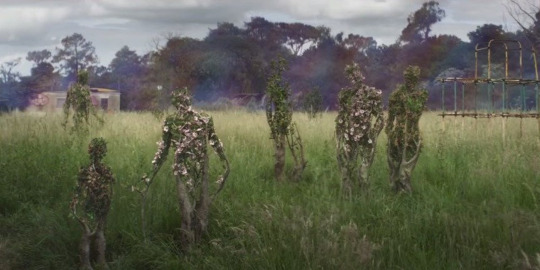
"The Talking Flower" is the second story from Nemui Asada's "Dear, My God" volume, and the plot is simple: main character Hana, a flashy careless businessman, drunkenly stumbles across a plotted plant (which resembles a head of a lettuce if it were also a rose at the same time) sitting abandoned in front of the florist shop across from his apartment. Hana picks it up and takes it home with him, only to learn that it's a talking flower—or more precisely, it's a flower "that God has allowed to talk," and only Hana can hear him. Hana, who lives a lonely single man's life, warms up to the idea of having what amounts to a very intelligent stationary pet, but is taken aback when he wakes up one morning to find that his cabbage rose has become a full, naked human being, or at least a thing that looks like a human being, even if it can only drink water. Worse still, the plant man is the spitting image of the florist shop's owner, a man named Miki, with whom Hana has a bad relationship.
There's nothing outright body horror about "The Talking Flower," but Asada adds her own flourishes with her art. Human!Miki and his florist shop are almost always conveyed in heavy shadow with lots of black and grey, as if Hana and Miki are in the eternal dark when their paths crossed (which is not untrue). In contrast, Hana and plant!Miki share scenes almost entirely in white space, including dream sequences where Hana gets to take plant!Miki to a botanical garden. When Hana wavers and begins to question how human plant!Miki can be, Asada brings plant!Miki into half-shadow: his face lit up by a TV screen, standing at the doorway waiting for Hana to come home, asking to share Hana's bed. Hana's attachment to plant!Miki is pure and wholesome, but Miki's presence is nevertheless suffused with eeriness. Asada never lets you forget that he is not quite human, even if Hana does.
The kicker is, of course, the ending, and if you mind spoilers you can skip this section.
Miki turns back into a flower; of course he does. This is the price all flower metaphors pay: the eventual disintegration, the fallen petals, a temporary bloom. Think Beauty and the Beast. The plant always dies. Nemui's twist, though, calls down a many-faced God who ends up being behind both Hana and Miki's fates and leaves open the question of how much of Miki was really human and how much of him was a potted plant on which both Hana and Miki projected their loneliness. In the end, the two humans meet and are given a second lease on life and, perhaps, their relationship. In the realm of bl or bl-adjacent manga, this is the trope ending, which isn't a complaint. After all, one of my favorite Ima Ichiko oneshots, "Always a Holiday With You," which you can find in her "Five Box Stories" collection, is this but without the plants. There, a high school boy is suddenly given custody of a shrunken version of his crush, a classmate that is currently in a coma due to an accident. A smarter writer would say something here about how this is just the old fanfic trope of hurt/comfort but taken out for a spin, which, probably true!
Like "The Talking Flower," "Always a Holiday With You" keeps ambiguous whether the relationship kindled by the magical realism remains after the spell has ended. There's probably more to be said about what these kinds of stories say about the idea of romantic love, and specifically how much of what we love is our own personal—and thus, potentially false—versions of the other. But for today, what I find the most interesting is the contrast between a human turning into a flower and a flower turning into a human. With the former, the fear is about losing freedom and freewill, becoming something that cannot express itself or feel, wholly dependent on the forces around it for movement and sustenance. In Miki's case, Asada argues that his life before Hana was already plant-like: isolated, merely existing from day to day, offering no emotion and receiving none. Yet by turning Miki into a plant, albeit one that can talk, God—or Asada—is able to give Miki life. He blooms, literally, under Hana's touch, because he is dependent on Hana's care which, in turn, endears him to Hana. Miki was most human, most alive, when he was not human and not entirely alive. A fun twist on the accidental transformation trope.
You can read "A Talking Flower" on Manga Planet (formerly Futekiya).
3 notes
·
View notes
Note
Hello. I found you because of your twitter. So you're also KnB fan? So excited? Are also a shipper? Who are your fav KnB ships?
Can I ask you BL recs that the couples' dynamics remind you of your fav KnB ships?
Sorry if you're not a shipper...Then who are your top 3 fav KnB characters? And what are your top 5 fav moments from the series?
Hello anon! I was and remain a very big KnB fan. I actually have a number of KnB meta posts on my other blog, perhaps most prominently this one on how Kuroko no Basuke is the most romantic manga I've ever read. It is in fact the only fandom for whom I have a dyed-in-wool honest-to-god would-defend-them-to-the-wedding-altar OTP, and that is Kagami/Kuroko. I am always a sucker for main characters in shounen but Kuroko in particular is a guardian angel to me, one with his own guardian angel (Kagami). I find him endlessly fascinating as a character but I also think of him like a beloved nephew and want him to have a happy ending (married to Kagami and raising multiple dogs). I just love him so, so much.
However, I believe in shipping for fun and for sport, not as religion, the result being that I consume(d) voraciously in the fandom even for things outside of my OTP. I loved MidoTaka and bad boyfriends AoKise, would go to war for the Seirin third year Kiyoshi/Hyuuga/Riko (sorry for the sudden het), and was obsessed with KiKasa (legitimately believe Kasamatsu would take a bullet for Kise before he would kiss him and is that not the ultimate romance). Almost every day I wage a battle with myself whether or not to go back and reread the manga or to finally finish the anime (which I maintain legiimately changes the characterization of some of the characters, specifically Kise).
I can't say that I can think of bl manga with the same dynamics as KaKuro. Though I will say I was reminded recently that before Kizu Natsuki was Gusari, she was Sashikizu, and she wrote a pile of KnB doujinshi. While she settled into her sweet spot with Haikyuu, those who accuse "Given" of owing anything to Haikyuu don't see that the central Ritsuka/Mafuyu (+ Hiiragi) story is actually very Kagami and Kuroko coded, Teikou trauma and Generation of Miracles ex-boyfriends and all. Kizu-sensei wrote "Given" for those of us who thought Ogiwara was dead, I'll just leave it at that. (Is that why I later wrote a KaKuro band AU? Who's to say.)
4 notes
·
View notes
Text
11/50: double vision (takahashi hidebu, "stigmata: love bites")
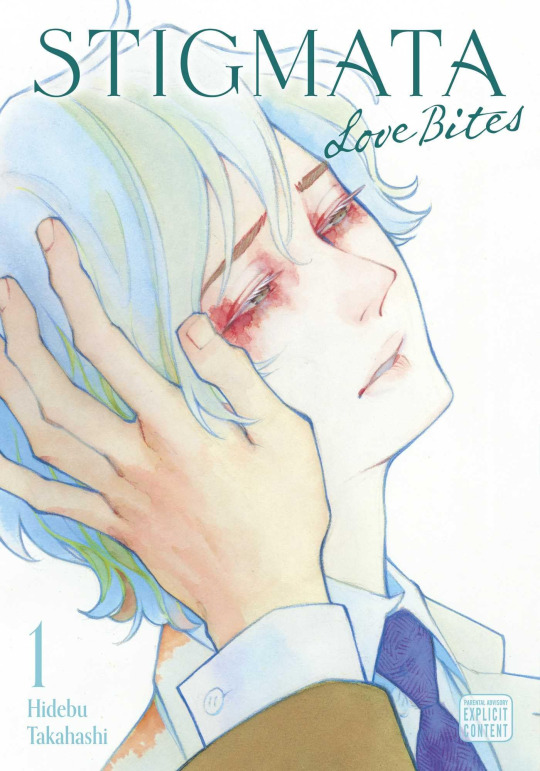
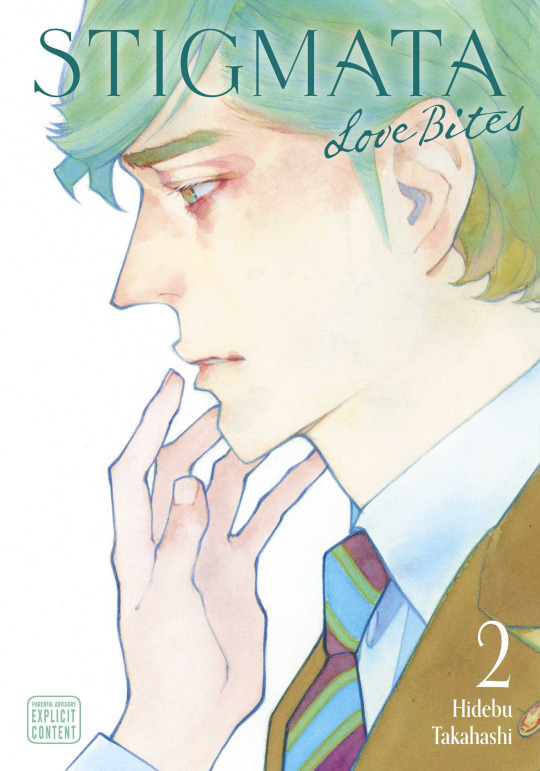
My favorite euphemism for dating is "seeing someone." No other phrase captures both ends of the romantic spectrum, both the fleeting glance of seeing someone out of the corner of your eye when crossing the street and the intensity of pinning someone with your gaze across a candlelit table. It alone feels capable of holding all of our figurative language about love, from the heavy to the light. Don't we fall for someone simply because we look at them ("love at first sight")? Don't we describe commitment and the monopolizing power of love by saying, we "only have eyes" for another person? We say, "to see her was to love her." We say, "to be loved is to be seen." If "eyes be the window to the soul," then what could sight possibly be but a vector to love?
Lovers aspire to "see" each other, to comprehend each other's souls, to be able to recreate their lover in the mind's eye without masks or pretense. But so too does the forensic profiler, the detective, the criminal investigator. In fact, more so than romance, crime and its fictional iterations lavish excessive time and detail to "seeing." The criminal stalks their victim; the crime scene investigator scours their surroundings for information both on the victim and the perpetrator; the dogged detective is the only person who really understands the mind of the elusive killer. Only the teenage lover left alone in the room of their crush could be more dedicated to trying to see and not disturb, to leave no trace but to take away the wholeness of another person, who is unknown to us now but, we hope, not forever.
No wonder, then, that in these genres we invent new ways of seeing. In NBC's "Hannibal," Will Graham can recreate in his head the events of a murder like a director staging a scene. In Shimizu Reiko's josei crime epic "Himitsu," new technology allows us to image a dead person's brain and see what they saw, as if we were watching a movie filmed through their eyes. And in Takahashi Hidebu's "Stigmata: Love Bites," we follow Asako Minami, who is cursed with the ability to experience the events leading up to and of a murder once he's presented with a murder scene. It's an ability that has ostracized him from family and friends, but with the help of his supervisor Kuroiwa, the senior detective of Tokyo's Special Investigations Unit 6, his body is a conduit for solving crimes, including the murder of Kuroiwa's ex-wife Mari.
"Love Bites" is actually the second draft of a story starring Asako and Kuroiwa. Takahashi first ran "Stigmata" (then subtitled Seikon Sousa, or Stigmata Investigation) as a seinen crime-of-the-week series in Shueisha's Grand Jump Magazine before it was canceled at six chapters. "Love Bites", the reboot, ran in the bl magazine Bloom, which would later also run Takahashi's other supernatural detective story "Psychedelia." Maybe that's why "Love Bites" has an atypical structure for a bl; instead of one long story that concludes with its characters more or less together in volume one and a pivot to a different subplot in volume two, it's more like a ten-episode miniseries that uses the full two volume length to explore the mystery of who killed Mari.
Freed of having to mimic the rhythms of a procedural, or perhaps cognizant that as a bl her story must now make feelings the plot instead of murder, Takahashi fills "Love Bites" with figurative language made into images, all the artistic trappings she has at her disposal. Blood bubbles out of Asako like a furious lava lamp, splattering against the floor and white backgrounds in endless dots and dribbles, a Van Gogh-ian nightmare. His dreams, where he is forced by Mari's memories to ride shotgun to her intimate moments with Kuroiwa, are haunted by the same big blobs, as if they and the blood bubble out of the same place. When Kuroiwa begins to fall for Asako in volume two, he too begins to sink into panels full of alternating blobby darkness and bubbling white. The illusion "Love Bites" traps us in is a sticky, liquid, fractal place, the boundary between reality and the supernatural. We cannot and should not believe our eyes. What we see cannot be happening. And yet, what we see is the truth.
What "Love Bites" contemplates (as does "Hannibal" and "Himitsu") is that there are two types of "seeing." To see someone is to understand them and, perhaps, to love them. To see as someone, though, is a special kind of emotional abomination. It is a transgression, an intimacy that is both more and less than love. In "Himitsu," seeing through the eyes of Kainuma, the serial killer who killed out of his love and longing for Maki, ruins Suzuki life. The curse is compounded when Aoki, already drawn to Maki, watches Suzuki's brain and is hit with the double whammy of seeing Maki through both Suzuki, and Suzuki-Kainuma's eyes. Doomed to be a Suzuki substitute from the start and now the living embodiment of Suzuki's memory, he is Eve and the apple both. Unable to resist, Suzuki takes from the Tree of Knowledge—Suzuki's brain—and then spends the rest of the story posing the same poisonous question to those who loved Suzuki. When we crawl into someone else's skin, can we ever come back from it? Or have we been forever poisoned by their visions?
These questions must have plagued Takahashi too. In "Stigmata," Asako struggles with how to maintain a sense of self when he is a repository for the memories of other people. In a particularly heartbreaking scene, he asks Kuroiwa if he should just let Mari's memories take him over. "Then, won't I basically be her on the inside? That means you'll get a chance to do things over with her." Aoki and Asako would have lots to say, I'm sure, if they were ever to meet for coffee.
But I think the theme of "Love Bites" is false visions, or rather, incomplete ones. Mari is mistaken multiple times for her coworker Makoto. Kuroiwa at the end of volume one embraces Asako and calls out Mari's name. Asako's body is female, then male, then female again in his dreams as he tries to digest the murder victims for whom he is a conduit. Even seeing through one person's eyes, Takahashi argues, can never be the whole truth. After all, in Kuroiwa's eyes, Mari had fallen out of love with him and thus ended their marriage. Asako, haunted by Mari's echoes, believes that Mari loved Kuroiwa even to her dying moment. But it's Makoto who fills in the missing piece that neither Asako nor Kuroiwa would have gotten to. Mari may have loved Kuroiwa, but she kept that love like a talisman, a prayer for better times, not a longing to return. She most of all would have never wanted to live on in Asako's body, as a zombie of the relationship she and Kuroiwa once had.
Asako may have had Mari's echoes, but I think what made Kuroiwa fall in love was all the ways in which he wasn't like Mari. He is not a cheery go-getter. He is not a competent career woman. He wants to be a burden on Kuroiwa. His helplessness, his desperation, and his offering up of his body as the only tool at his disposal are the things that make him precious to Kuroiwa. No matter how much he may be filled with Mari's memories, it is the realness of Asako and Asako alone that Kuroiwa reaches out for.
"Stigmata: Love Bites" is available to read on Manga Planet (formerly Futekiya). You can also read "Psychedelia" there; it's a one-volume story that also is about supernatural crime solving, and as an added bonus appears to be set during the pandemic (all characters featured wearing facemasks). "Stigmata: Love Bites" is also available in print or digitally from SuBLime.
6 notes
·
View notes
Note
So ever since I found mlm and wlw stories (especially fanfics and BL & GL media), my interest in het romance decrese a lot, and what I search for is just the dynamic between mc (male) and male lead or mc (female) and female lead...
I don't want to read mc (female) and male lead or mc (male) and female lead...And what I want to read mostly are just mlm or wlw stories for romance....
What do you think is happening to me? Is it really weird?
This ask immediately caught my eye and I have been struggling on and off this weekend with how I should answer this.
So first. "Is it really weird?" No! It is not weird at all, and don't listen to anyone who is telling you it's weird. I don't really believe in pathologizing our tastes in media (except in extreme cases, and this is not an extreme case).
Ok, that's the easy part. "What do you think is happening to me?" Anon, I don't know you, and I don't know your personal circumstances, so I can only answer this in generalities and from my own personal experiences. If I make assumptions and they are wrong, please understand that I do so not from a place of malice or condescension, but simply from a place of unknowing. I am the blindfolded man in a room with an elephant, tugging on its tail and saying "this is a snake."
Any number of things, all totally normal, could be happening to you. You could just be drawn to certain tropes or plots or character dynamics that are very common right now in certain bl/gl media or fanfics but less common in m/f romances, or at least the ones that are popular now. Finding things to enjoy takes time and curation and often, too, curating where you get your recommendations.
Or, you could just be really excited about the fandoms you've discovered through bl/gl media or the canons you're reading fanfic in. A lot of bl/gl media have welcoming and exuberant fandoms where it's easy to meet friends who share your tastes! And to the point about curation, the more friends you make, the more you'll get tailored recommendations from them, which means the more bl/gl media you'll have to consume. Heaven knows my to-read pile grew exponentially since I came back to this tumblr.
Or, you could be learning more about yourself in these bl/gl stories. I think being drawn to bl/gl media (and fanfic starring mlm/wlw romances) is a very common way for many queer/not-straight people to explore their own sexualities. We often use fiction as a way to imagine ourselves in other lives and to grapple with how these alternate lives make us feel, if there are new modes of self-expression we aspire to, whether fictional characters are putting in words feelings we didn't realize we had. Even as a straight and very cis woman, I find reading bl/gl helps me articulate certain conceptions of what relationship should be and the pressures we face from society with respect to growing old, having community, raising children, etc. A better life is possible, and fiction helps us dream it into being.
Ultimately, I think there is no harm in following your heart and reading more of what you like. But I also do believe good het romances and m/f relationships and friendships are out there (LMAO what a sentence). You may just need to invest some time in pinpointing what it is you like in your fave m/m or f/f relationships and searching out those things in non-bl/gl media! For example, in my case, I love detectives, crime procedurals, and odd couples forced to be coworkers. Usually, this leads me down m/m paths (like, say, "Beyond Evil"), but the minute I saw the plot summary for "The Bridge (2011)" I knew it would be catnip for me, and indeed the friendship between the two lead detectives in the first two seasons of the show (one male, one female) remains hands down one of my favorite pieces of fiction.
4 notes
·
View notes
Text
10/50: be sweet to me (reck/yeongha, "hate mate")
It's another week where I come to you not with a rec but with a meditation on (what else?) love and, specifically, the conundrum of being loved by a yearner.
There was a tweet going around that was like, "everyone person in bl fandom has that one bl that is their brand and reminds everyone of them." Well, I have always been a contrarian and all my friends who have known me for a long time in fannish spaces have accused me of hating love and/or happiness. But if you asked, they could all name the one dynamic that gets me every time: the not quite love triangle where character A and B are in a relationship that is actually about A or B's feelings for character C. This is why I am always game for a story where a man who has been in hopeless unrequited love for a long time suddenly finds himself being pursued by a stranger, or when a main character, who is in a relationship, is forced to confront an ex with whom he still has unresolved feelings.
So in a way, "Hate Mate" was written specifically to target me.
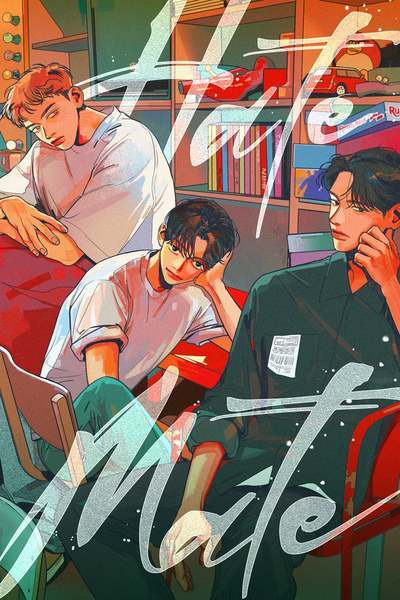
(This post will have spoilers for the entirety of Hate Mate.)
Bang Subin has been in love with his best friend Nam Hyeonwoo since high school. Buoyed by a night of drinking and Hyeonwoo's return from his two-year military stint, Subin manages to finally talk Hyeonwoo into sleeping with him, only for Hyeonwoo the next morning to deny anything ever happened and reveal that he has had a long-time crush on Subin's boss, a beautiful older woman named Yeona. Increasingly uncomfortable in the apartment he shares with Hyeonwoo and sick of seeing Hyeonwoo try to woo Yeona (who wants nothing to do with dating a young man), Subin turns to Kang Jun, an older salaryman Subin met on a gay dating site. Though put off by Subin's immaturity and the fact that Subin is obviously using Jun to get over Hyeonwoo, Jun finds himself first trapped and then reluctantly drawn into caring for Subin. Hyeonwoo, meanwhile, is forced by Yeona's repeated rejections to confront his own feelings for Subin, eventually coming to the realization that he does wants to be with him. Too little too late, however, as Subin has decided to close the book on his long-time crush on Hyeonwoo for a new relationship with Jun. Though they are not quite happily ever after, they move in together, and Hyeonwoo leaves Korea for a music career in Los Angeles so that he never has to see Subin and Jun together again.
Never, that is, until two years later when Hyeonwoo comes back to Seoul for "Hate Mate" season two.
You know I am hard on first loves and first men and generally find any story of "we met when we were younger and now we are destined to be together" to be, by default, suspect. But what is there to love about Nam Hyeonwoo? We consider him a love interest at first because Subin loves him and envies his talent and allows Hyeonwoo to make him miserable. We consider him a love interest later in S1 and throughout S2 because he tells us he loves Subin. But his actions are that he ignores Subin for years, repeatedly rejects Subin's feelings, lies to him about a drunken sexual encounter, interferes in Subin's life despite claiming to be in love with another person (woman), and then goes back to ghosting Subin for two-year periods. The one moment of kindness he shows (going to pick up Subin with an umbrella on a rainy day) is derailed by him ditching Subin for Yeona. The depths of Hyeonwoo's feelings are entirely in his head to which we, the readers, are given full access, but no one else.
The problem with Nam Hyeonwoo is the problem with any story that stars the yearning man as a love interest. Yearning is not, by itself, love. Yearning is the twin of limerence, the destructive sibling of self-soothing, an outpouring of emotion within ourselves, for ourselves. It is, in some ways, a delusion that happens entirely in our heads. It is not a relationship we have with the other person. The other person is simply an object.
Yearners survive in art because they write poems and draw portraits, because they model plays and novels on their affections, because they leave behind letters and journals. This is, of course, why Hyeonwoo is a musician and why "Hate Mate" S2 features music he has made about his feelings for Subin. But this is yet another way in which the object perfects the yearner's life, as opposed to a way for the yearner to engage the object. High school Subin was very important to Hyeonwoo, in fact maybe the only thing that mattered to Hyeonwoo after his parents died. But what does that matter now to 23-year-old Subin, or 28-year-old Subin? What can Hyeonwoo offer for Subin, instead of merely at him? Can love be judged just on depth of emotion? Is love just who cares the most in their head?
If all we craved was to see one man say in words that they love another man, then bl as a genre would be enough. So why, then, do we keep turning to shounen manga and insisting there are deep, loving m/m relationships hidden in plain sight? I think it's because male characters in shounen manga are always doing things to or for or at another male character, and that feels like love. If they yearn, they cannot do so purely emotionally, because it is a genre that by and large rejects pure emotion between men. So instead, they become better rivals or students or mentors or partners; they grapple with each other physically; they fist bump or strangle or punch or high five each other; they connect.
Subin has loved Hyeonwoo for years too, but he is a different kind of desperate bl man: the orbiter of unrequited love, who does anything he can to keep himself close to the object of his affection. So he learns to cook for Hyeonwoo, he takes care of Hyeonwoo when he is sick, he learns guitar and works at Hyeonwoo's old workplace to remain close to Hyeonwoo's passions, he tests Hyeonwoo's affections over and over again even though he knows where he falls on the list. Is it any surprise, then, that Subin ends up with Jun, whose biggest fault was simply committing to a half-hearted affection too quickly?
Which is to say, there could have been no other ending for "Hate Mate" except Subin choosing Jun. Jun's view of love is punishingly rational, practical, productive. In a relationship, he puts in effort, for which he is rewarded. He compares it to studying, where effort results in good grades; Subin compares his approach to cooking, which (usually) produces food. For Subin, who spent seven years longing for a man who gave him nothing, this is a revelation. Through his time with Jun, Subin is incontrovertibly changed, though he (and perhaps Reck and Yeongha) does not fully comprehend it. When Subin rejects Hyeonwoo in S2, he says, "I would fantasize about you being in love with me. I'd imagine you regretting the way you treated me and begging me to forgive you in anguish." But all that imagining, all that fantasizing, it is over now. All Hyeonwoo can offer Subin are reflections on their past together, and Subin at 28 becomes a person who values work and effort over feeling. Love or the absence of it does not live in only in his head. He makes curry for Hyeonwoo and tends to Hyeonwoo's body one last time. He cannot do that for Hyeonwoo again, because those actions are the vectors through which love moves, and vectors should be a two-way street.
I hope in saying all these things that I sound convincing. The reality is that I struggle with "Hate Mate" S2. Not because I think the ending is wrong—I believe, strongly, that Subin should not be with Hyeonwoo. But reading "Hate Mate" S2 feels like grading a math problem where the student got the right answer but they showed their work and you have no idea how they got there. "Hate Mate" S1 is a finely crafted story about Character A (Subin) getting into a relationship with Character B (Jun) because of his feelings for Character C (Hyeonwoo). Trust me, I am a connoisseur of such stories. But in trying to make "Hate Mate" S2 a story about Subin choosing Jun despite Hyeonwoo's feelings, Yeongha and Reck have made Hyeonwoo a pointless, bothersome presence, a bad stink that lingers and takes time and energy away from the actual issues that Subin and Jun are facing. What I wanted for Jun and Subin, I think, was something close to what Cocomi gave the main characters of "Send Them a Farewell Gift for the Lost Time," a "break-up then make-up" story focused on the characters parsing out what they need to fix in a relationship versus what they need to fix in themselves. How do you find your way back to love when it feels like all you have are the actions? How do you soothe another person's insecurities? What happens when you know each other's buttons too well, and push them because you mistake reaction for resolution?
Instead, with Hyeonwoo there, "Hate Mate" S2 becomes a proper three legged triangle, with Hyeonwoo and Jun's mutual hatred functioning as a force repulsing them back towards Subin. It's easy to get lost in the drama, declaring that you love your boyfriend because you fear he might get stolen away by his first love. That is the work of yearning, and yearning, we know, is not enough.
You can read "Hate Mate" on Tapas. Title is from "Be Sweet" by Japanese Breakfast which feels extremely Subin-coded.
6 notes
·
View notes
Text
What may give us some insight, however, is the likelihood of our dependence on comics as an escapist form of media rather than pieces that we engage with critically. Especially, the works in the romance genre. ... By definition, the escapist approach to fiction provides a diversion from real life and the unpleasantness of it. We can agree that life sucks, or at least, the ways we live in this capitalist hellhole suck and we rely on our routine fix, to accumulate enough HP to throw ourselves back into the lion’s den. The diversion from the critical approach seems to be synonymous with escapism. ... the point I want to make is that when we’re so psychologically reliant on these works to feel good or recharge, anything other than a happy or satisfying ending feels akin to betrayal. This statement doesn’t dismiss comics with tragic plot points—an ending where the characters go through so many hurdles and after too many missteps, get together, can be very cathartic in its own way. Knowing that the two male leads will end up together can even hold your hand and help you go through the painful chapters.
Mulling over these paragraphs from Nora's post (which I agree with!), I think another issue is the recent tendency to moralize / identify with characters / assume the characters represent the author's view towards real-life people. Examples of this are people assuming that one's fictional faves (be that in narrative terms or characters) are representative of oneself, so that the story/character being problematic feels like a verdict that you are problematic, or treating characters as if they are real people (because you want them to be real, because they are real to you or resemble in their circumstances the circumstances of real people.) I am increasingly uncomfortable, too, with praise or critique of stories revolving around "relatability"; I think when we aim too hard at making sure readers can "see themselves" in a story, we get weaker stories. But that is because I have always valued characters or stories that a high degree of "specificity," that is, when a story or a character or a style is so obviously the creation of their creator(s). (This is why I am highly susceptible and must always be on guard against succumbing to falsely applying auteur theory, but it works in bl for the most part because often they are created by one or two individuals.)
Nora rightly points out that fiction can be escapist. In other words, "if we wanted to see sad things happen, we might as well watch the news!" (A sentiment I often agree with and see lots of merit in.) But I think another part of (recent) escapism (in fandom) is leaning on fiction to say, "a happy ending is possible for me, because it happened to this character." An unhappy ending feels like a message from someone that you are not worthy of a happy ending -- this feels even more personally like a betrayal.
But put bluntly, Ash isn't a real person; he's not a real victim and his happy ending is also not real because the only thing that is real is the story Yoshida created. He is not being punished, because he cannot be punished. He is a fictional human and he only serves to advance Yoshida's narrative ("killing begets more killing and is never a solution"). This is a narrative we can disagree with, and many do, but it does not mean it encompasses a moral view from Yoshida with respect to what Ash deserves if he were a real person. Banana Fish was obviously structured in Yoshida's mind to be a tragedy. That we want Ash to have a happy ending with Eiji, but that he is unable to do so because of the totality of his circumstances and the story, is the point she wanted to make. Yoshida is not saying she believes this is the right ending or a good ending for Ash, but rather this is the ending she had in mind because she wanted to write a very specific tragedy.
WHERE DID THE TRAGIC ENDINGS GO?
Sponsored by this X (formerly Twitter) discourse. There is nothing unusual about X going up in flames, users being divided into opposing groups, and people claiming the other party lacks the necessary reading comprehension. This is the norm of our average social media experience. So what’s on today’s menu, you might ask? Our IT boys, of course! Banana Fish is a shojo manga that started its…
#no conclusion to this post because i'm lazy#and can't think of anything to say that nora doesn't already in her original#really love the point about certain cultures having cyclical narratives#not tagging this because i am not a masochist
8 notes
·
View notes
Note
Hi, can I ask your top 10 favorite BL media ever (can be manga, anime, manhwa, manhua, etc)? Why do you love them? Thanks...
Damn, way to ask for an impromptu thesis defense! jk but this is actually a very difficult question for me. There's no reason why you should known this about me, but I’m one of the least decisive people when it comes to answering "what is your favorite ____?" or "what are your top [x]?" So here are ten bl manga that I have loved, in no particular order, which I hope will at least partially scratch your itch.
1. The Cornered Mouse Dreams of Cheese (manga and movie), by Mizushiro Setona
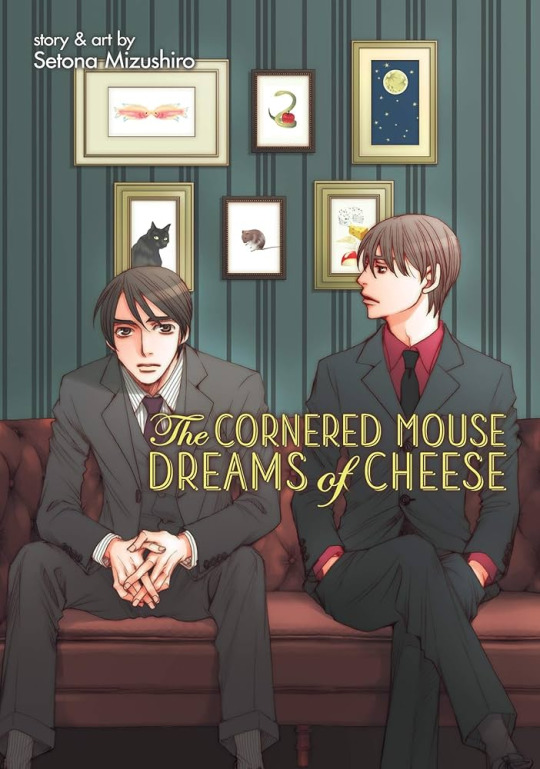
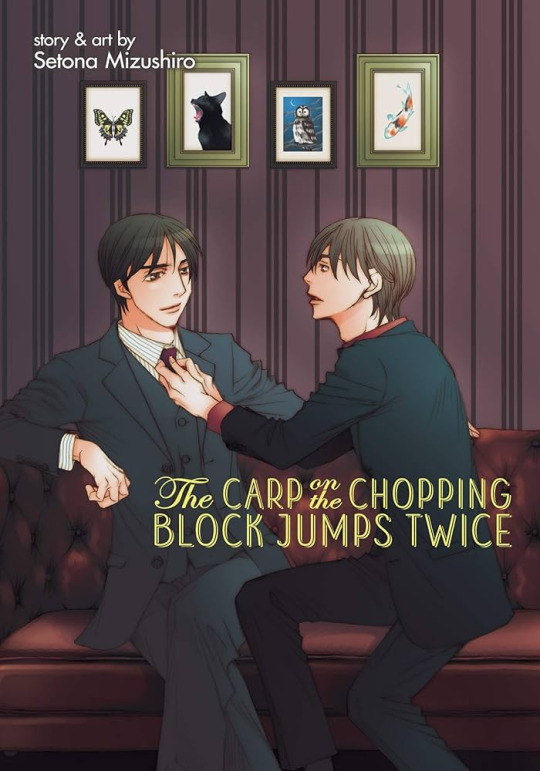
I've already written about my "Cornered Mouse" feelings twice, most recently almost ten (!) years ago here. There was a period a few years ago where I'd reread both "Cornered Mouse" and "Chopped Carp" on Valentine's Day, and every year I'd keep finding new things to enjoy about it. So fortunately/unfortunately, I don't have much more to say here. Imagase is a classic bl type, a particular fan favorite archetype of the flirtatious and obsessive bottom who has hidden his pure love for so long that it can now only be expressed through sly and manipulative means. Mizushiro Setona has always excelled at portraying desperation (which is related, but not identical to the recent trend of "yearning"), and with Imagase she is truly cooking with gas--every panel of Imagase hurt and lashing out at Kyouichi is a work of art. But what really makes this story excel is Kyouichi, who fits one of my favorite archetypes of "the man who is kind of bad but not for any particular egregious reasons." He lets Imagase bribe him into a bad scenario, lets himself be lulled into complacency and a domestic relationship with Imagase, then too easily capitulates to Imagase's doomspiral tendencies, before finally leaving a very good woman so that he can get back with his gay ex-lover. Put like that, he sounds like a bouquet of red flags, but actually reading the story reveals a man who is by turns considerate and selfish, openly vulnerable and closed off, emotionally intelligent and a dumbass. Perfect catnip for me.
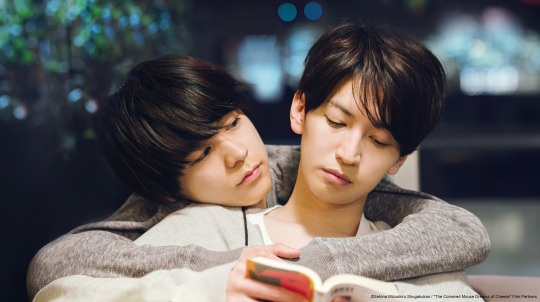
As a bonus for this post, I also want to plug the movie version of "Cornered Mouse Dreams of Cheese." I haven't watched many live action bl adaptations, but this one is a highlight to me because it really leans into the idea of being an adaptation. It deviates, quite significantly towards the end, from "Cornered Mouse" and especially the events of "Chopped Carp," but in a thoughtful way that highlights how much the screenplay and the director really internalized the story. Instead of simply trying to get the actors to copy and paste the manga panels into real life, this is truly an alternate version of Imagase and Kyouichi, one that highlights how they are both bad people to fall in love with, but maybe bad in just the right way for each other. In some ways the movie version of "Cornered Mouse" is actually the ideal live action adaptation of the Ugetsu/Akihiko/Haruki subplot of "Given," which is a thought I will have to unpack some other day.
2. Old-Fashioned Cupcake, by Sagan Sagan
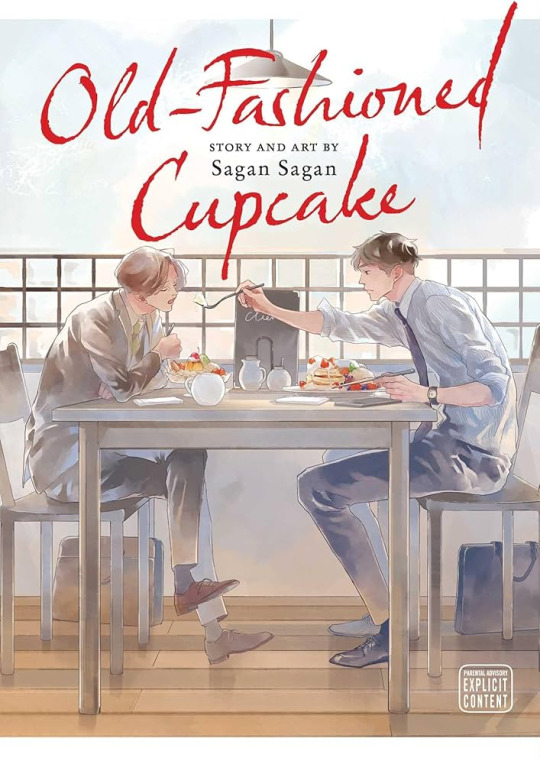
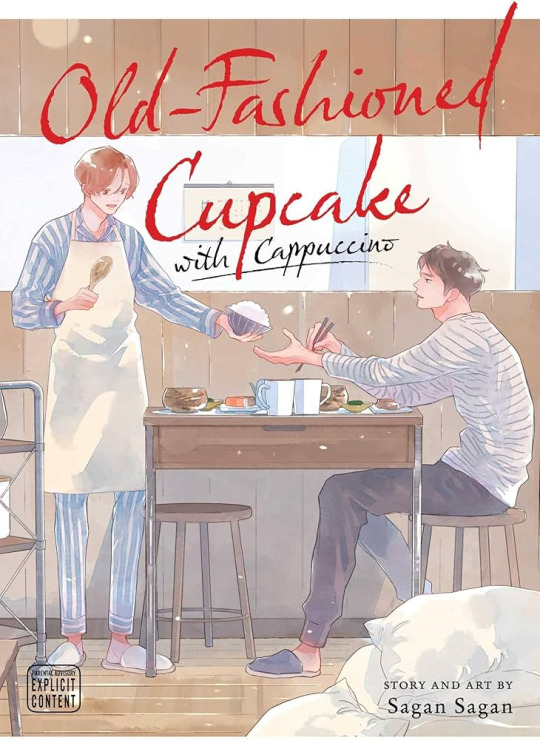
I recently wrote a whole post on it, so enough said! There's a reason I own both the JP and Eng version of both volumes as well as the Chil-Chil booklet from when they won best series in 2021. This also has a drama adaptation, which is very serviceable! However, one of the best things about the original story is Sagan Sagan's incredible paneling and technical skills, which can only be enjoyed through the manga.
3. The "Pornographer" series, by Marukido Maki
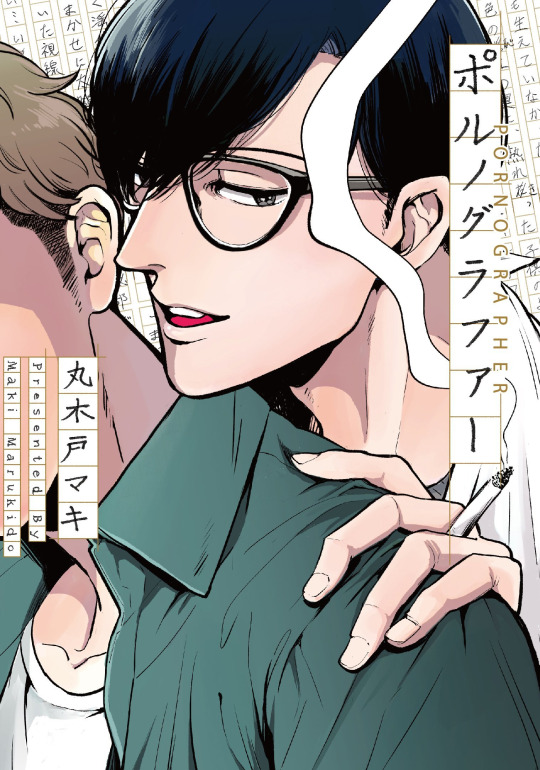
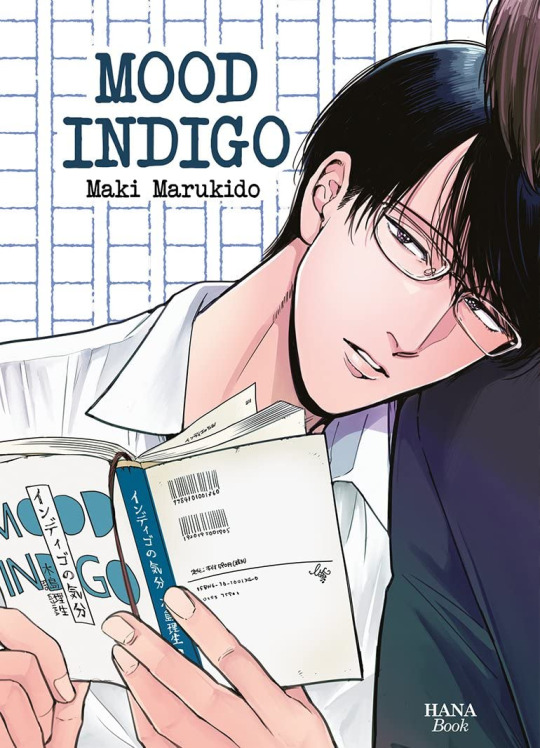
Back when I was still making Futekiya threads, I did a little rudimentary blurb here. Of her stories I've read, "End of the World With You" is the best and most accomplished, but the Pornographer series ("Pornographer," "Mood Indigo," and "Pornographer Playback") is the one that most grabbed me by the heart and throat and shook me to my core. Kijima is an underrated Terrible Man (see above discussion of Kyouichi from "Cornered Mouse"). Yes, his initial gambit with Kuzumi is trolling of the highest order, but the true depths of his personality flaws (his selfishness, his stubbornness, his cowardice) are slowly and expertly revealed through the course of the story in a way that makes me clench my fists, it's so good. I never turn down a story that is about inspiration and writer's block, and the fact that Marukido Maki paired that story arc with a multi-year saga of two men in a kusare-en relationship (Kijima with his editor Kido) is the cherry on top of the most luxurious sundae. A dynamic I love is when two people realize their attraction to one another but mutually realize they are unable to act on that attraction in a meaningful way because of various circumstances, and that is "Mood Indigo" in a nutshell. That these themes (Bad Men, trolling, a relationship that happened at the wrong time) all come back in "End of the World With You" just proved to me that Marukido will always be a bl idol to me.
4. Secrecy, by Haruno Mami
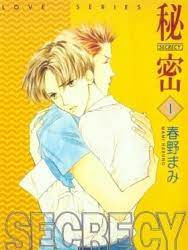
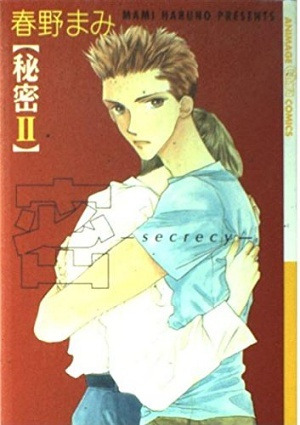
Short Twitter thread about it here. Probably the weirdest entry on this list, but it's a story that has stuck with me for twenty years (!). Upon rereading, it's surprising similar to Pornographer: a golden retriever-coded (literally, based on Haruno Mami's interstitial doodles) younger man falls in love with a beautiful icy older man who takes advantage of him. There's an uneasiness to the relationship of the main couple here as they navigate the age gap and differences in their abilities to be vulnerable/express love and affection. It's rare to see a short-ish bl so readily admit that the main couple struggles to be on the same page and yet is so adamant and convincing that the main couple loves each other and wants to make it work. Hiroki, the older businessman, is cognizant of his issues, even going so far as to say that he is caught up in his own sense of superiority and self-pity, which makes him treat Satoru poorly. But Satoru has main character energy, with an Itadori Yuuji-like capacity to absorb the terrible things that must happen to him, and through sheer force he powers them into a happy ending. A story that is very much of its time (1996) but nevertheless timeless to me.
5. When a Man Loves a Man series, by Nitta Youka
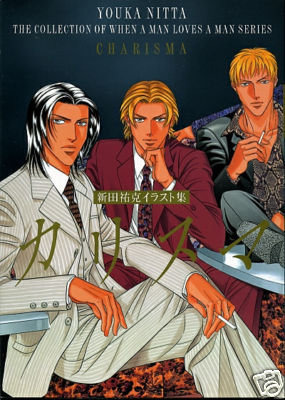
I love to be contrarian, so of course this is my favorite Nitta Youka series and not Harudaki. "When a Man Loves a Man" is IMO the host club story to end all host club bl stories and the original love triangle discourse-bringer, with powerful maneater uke Takaaki at the center being flanked on one side by Iwaki, king of the oily seductive older men semes, and on the other by Shinkawa, one of the most pathetic/delightful "too proud to say I love you / work rivals in the streets and hangdog yearner in the sheets" younger semes. This is a telenovela of a bl, one for the messy bitches, a little ode to exes who keep coming back in your life and fucking it up, more a story about managing pride and ego than falling in love, which makes it kind of like a seinen manga but with sex and hosts instead of cooking or fighting or detective work or mid-life crises. The early volumes take patience as Nitta discovers her style and becomes more comfortable with faces/anatomy, but the later volumes are the stuff of 2000s bl opulence: long legs, suits with big watches, host club backgrounds that look like fancy hotel lobbies, and men with center parted long bangs blowing in the breeze.
6. Illumination, by Yamashita Tomoko
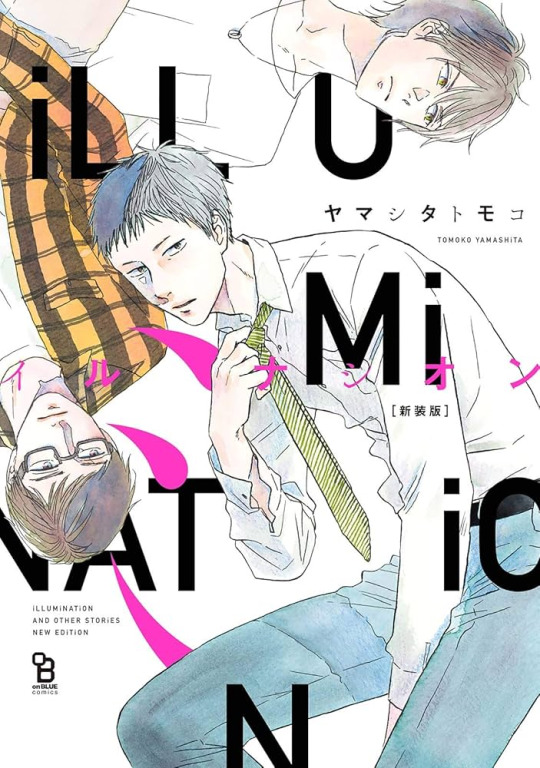
I wrote a full review of the series for my Notion site, so I don't think I have much to add here. Yamashita Tomoko is another one of my manga idols; she can do no wrong as far as I'm concerned, and "Illumination" is one of my favorites. It's a typical one volume bl with a longer title story and several unrelated shorts but shows off Yamashita's skills at quickly sketching out characters and imbuing them with an ordinary, realistic melancholy. I only wish to one day write something with as much grace and punch as "Illumination."
7. Endou-kun no Kansatsu Nikki (and sequel), by Hayakawa Nojiko
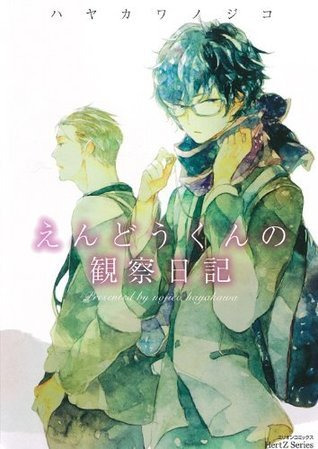
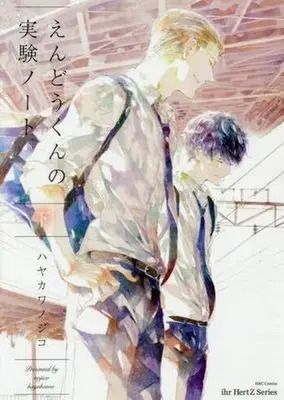
The only entry on this list that has the typical "two dudes in high school" plot, which is me accidentally telling on myself. Crudely, this is a story about lust and adolescent passion, but rendered so artistically in Hayakawa's style that it seems more poetic than it has any right to be. In my post recommending "Ima Made Kore Kara" (a collection of doujinshi that are vaguely related to the Endou-kun and Kurayami stories), I wrote that Hayakawa has "a pliant, soft style with her lines and paneling that reminds me of Yamashita Tomoko" and that "she loves using negative space to move you from one side of the page to the other." Her characters are rarely situated in detailed backgrounds, mostly against white space, but that highlights her elliptical style, with panels that are wholly focused on a hand reaching out for someone, the back of a character's head, a silhouette. And very few bl mangaka use sound effect lettering as effectively as she does, like in one of the early chapters of "Kansatsu Nikki" where the sound of a passing train crowds out the characters in a tense moment. All of Hayakawa Nojiko's series feature beautiful art, of course, but the Endou-kun series in particular feels like a descendent of the Year 27 style. The story itself is good as well, with lots of little, well-observed character dynamics and dialogue, but what's life-changing really is what Hayakawa Nojiko can do with a little bit of white space and some lines.
8. Red Blinds the Foolish, by Est Em
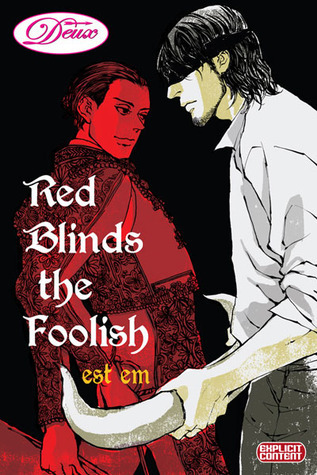
One of the most est em of est em collections, as it stars a longer title story on bullfighting (she would later go on to make a whole seinen series about bullfighting called "Golondira"), a shorter unrelated one-shot on shoemaking (she would later go on to make a whole series on shoemaking called "Ippo"), another one-shot on soccer (a throwback to "Ultras"), and finally a story about the stories we tell ourselves about art, starring ballet ("Tableau No. 20" and "Seduce Me After the Show"). Basically you could read this one volume and get the whole est em primer, and that's not even mentioning the fact that one of the chapters of the title story reuses images from her time as a Death Note (!) doujinka.
est em's best stories operate from a place of dream logic, the way a good movie must start from an arresting image. In the title story, everything revolves around penetration: sex of course, but Mauro's work in the slaughterhouse, Rafita's performance as a matador, the horns of the bull piercing through human flesh, a stabbing from Maura's past. It's easy to see why bullfighting appeals to est em, who in the title story braids multiple narratives about living and dying into the doomed figure of the matador. In est em's world, the matador is no different from the bull, which he impales; victory over death is a day-by-day affair, so there is no point crying over the outcome, only the artistry of the present moment. A heady, philosophical theme that seems like it would make for overwrought reading, but est em's skill is translating those things into bold, dramatic images: Rafita's cape which moves like a separate limb, the ribs of a bull echoing blood draining into a grate, the loneliness of the matador in a big empty ring, early morning after a cow gives birth. I don't think "Red Blinds the Foolish" is est em's best work, but among her bl works this is the one that most obviously summons up a mood, a smell, a place, and a theme. One could teach a whole writing workshop on it, if it were still available in print (RIP Deux Press).
9. The "Mainichi Seiten" series, story by Sugano Akira and art by Ninomiya Etsumi
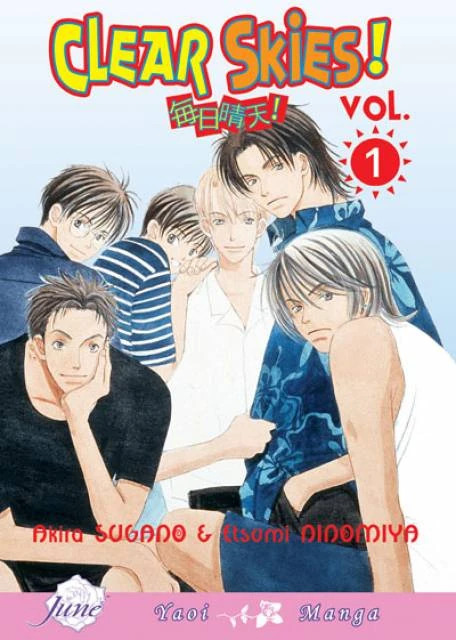
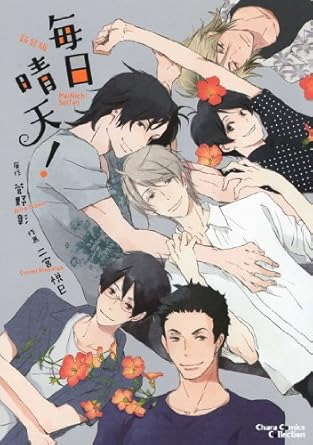
If the Mainichi Seiten series were tagged like an AO3 fic ("raised by brother," "everyone in the family is gay," "picked up off the streets," "found family," "writer/editor"), you'd think it'd be like any number of similar stories, maybe even a "Super Lovers" clone (god help us). But very little I've read in the world of bl has come close to the journey Mainichi Seiten takes us on. The story begins, rather inconceivably, with Obinata Taiga learning that his older sister has married his former high school crush Asuou Shuu before leaving the country. Taiga is the eldest of four brothers and happens to be Shuu's editor at a sci-fi magazine. Shuu, on the other hand, has brought with him an adopted son who is about as thrilled with this setup as Taiga. And we're off to the races.
Mainichi Seiten begins with Taiga and Shuu's story, but its longest arc is actually about the youngest Obinata brother Mayumi and Shuu's adopted son Yuuta. The series as a whole is a startlingly insightful meditation on family. What does it mean to grow up? How much can you take for granted that your family members understand you, and how do we communicate with the people we love? Mayumi is one of my favorite bl characters, a willowy impish bishounen who shamelessly crosses back and forth between "being girly" and "being a man," and he's one of the best fictional representations to me of how we "codeswitch" between interacting with our family and interacting with friends/strangers. And Taiga, Shuu, and Yuuta, both individually and together, are a brilliant rumination on loneliness and acceptance, and show that it is impossible to believe one person can satisfy all your emotional needs. Love comes in all different forms, from all different perspectives, in all different life stages -- it truly takes a family in the case of Mainichi Seiten, even if that family is the most unconventional blended one.
"Clear Skies" is unfortunately another victim of the DMP/June limbo, which published the first installment (volumes 1 and 2 of "Clear Skies") but never got to the rest of the stories in this series. It ruins my day every time I think about it, so I try not to think about it very often. That said, I'm definitely due for a reread of this whole series.
10. Choco Strawberry Vanilla, by Psyche Delico
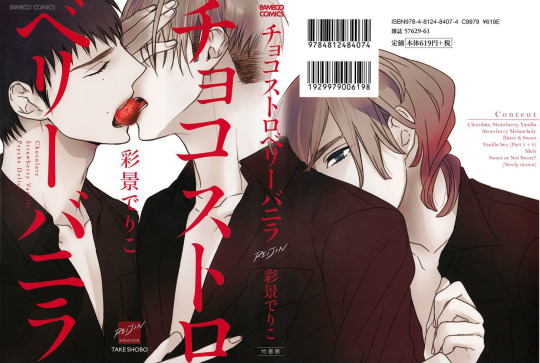
"Ohhhh my god Cathy do you like a story where there's a chaotic and uneasy love triangle? Where two people have a long and complicated history with each other that cannot quite be labeled as love? And a third party is dragged into the mess and you feel really bad for him? Should we tell Doyak? Shall we reread Love or Hate?"
I'm actually joking in this case because "Choco Strawberry Vanilla" is more than a love triangle, it's a primer on how not to do polyamory. Rarely do you ever see a love triangle that is so balanced (any one member of the triangle feels some sort of way about the other two) in its extreme imbalance (no two people's feelings are fully reciprocal or on the same page). "Canis" this is not; Psyche Delico's specialty is the unhealthy relationship that goes on for too long because the characters are willing, if not actively desiring, to be treated poorly. If the characters of "Choco Strawberry Vanilla" could or wanted to talk about their feelings and set proper expectations and boundaries, they would not be in the situation they are in in the first place, but as it is, one of them is learning to identify jealousy like he's on the world's most psychosexual episode of "Blue's Clues," one of them is willing to be treated as a spitroast conduit so long as he sometimes gets cuddles and a nice smooch on the forehead, and the third is... I seriously don't know what's wrong with Take and I don't want to know. This premise--three outwardly normal but inwardly emotionally fucked up men fall into a polyamorous threesome-- shouldn't work, but it does. It's not pretty, it's not healthy, and you should not try this at home, but damn if Psyche Delico doesn't sell it as an utterly unique entry into the bl genre.
And that's everything! I hope you enjoyed this, even if it may not be exactly what you're looking for. At the very least, well, I hope this gives you a little peek into my aesthetic principles, which seem to consist primarily of ummmm bad men failson-ing their way into uneasy happy endings...!
#too much to tag#i really wanted to include “farewell my concubine”#the og bl#but is it really bl????#it is to me
38 notes
·
View notes
Text
09/50: manic panic ("healing paradox," "color recipe")
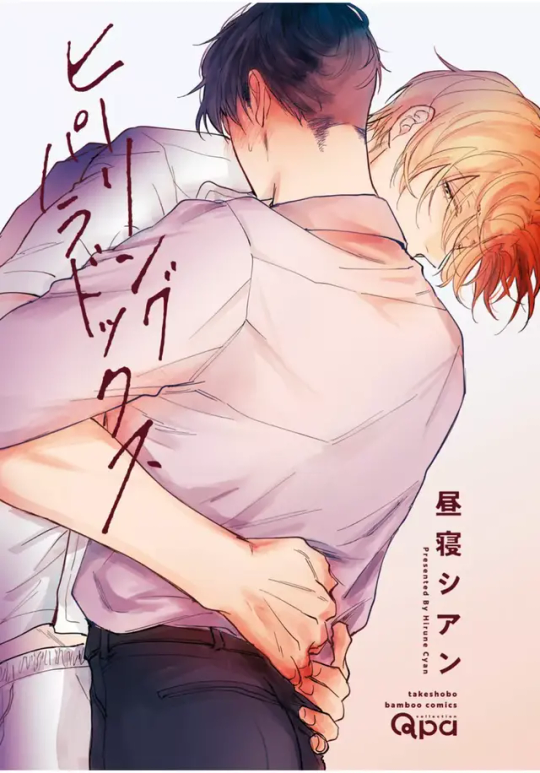

Reader, I may have misled you with my Tumblr url, which seems to imply that everything I write up will be a recommendation. And I do endeavor to be positive. This week's entry is not a pan—far from it, I was interested in both stories and have a Lot to Say. But I come, also, armed with confusion and critique. It had to happen at some point, so it may as well be this week.
Kuroiwa Naoto is an ad man who is in need of some serious rest and relaxation. Unable to actually achieve any kind of meaningful work-life balance (this is manga Japan) and armed with a former baseball player's inherent masochism, he stumbles across Kishibe Kazuma, a chiropractor/physical therapist/masseuse hybrid who is able to immediately zero in on Kuroiwa's pain points. Their first session ends with Kuroiwa finally relaxed and fully asleep and Kishibe jerking off on Kuroiwa's face. So begins "Healing Paradox."
"Healing Paradox" is, surprisingly, Hirune Cyan's debut work, which beggars belief, because she has the veteran artist's understanding that bl is one of the genres where you can just sort of throw a thing out there and never full address it as long as you keep hitting the other genre notes. It'd be one thing to make a move on a customer, as Kishibe does by chapter two with a nipple massage that leads into full-on sex, and another, far more disturbing thing, to ejaculate on a sleeping customer without even the barest whisper of consent or fair warning. The former is business as usual; any bl that is too specific about the details of a character's profession is intending to use that profession as a lead-in to sex. The latter, on the other hand, is off-putting, even disgusting. So "Healing Paradox" wisely moves us forward very quickly, with Kuroiwa experiencing pleasure like he's never experienced under Kishibe's insistent touches, Kishibe managing to restrain himself so that Kuroiwa ultimately makes the next move, and a revelation that Kishibe and Kuroiwa met as children, in a confluence of events that set Kishibe on his current career and life path.
Kuroiwa and Kishibe's backstory is, of course, nonsensical, and I'm not just saying this because I hate when characters meeting as children is an important plot point. I emphatically love Scarlet Beriko's "Fourth Generation Head Tatsuyuki Oyamoto" after all, which features a very similar setup, where one character's childhood weakness becomes the other character's inspiration to become resilient, strong, essential. But Tatsuyuki and Nozomi met briefly in circumstances that understandably made it difficult for Tatsuyuki to recognize Nozomi, and Nozomi is straightforward when they are reunited. On the other hand, Kuroiwa and Kishibe hang out together as kids, to the point where Kishibe even practices his amateur massage skills on a young Kuroiwa, and Kuroiwa gives Kishibe a meaningful gift, and you want me to buy that Kuroiwa doesn't remember him at all?
The problem is that "Healing Paradox" is a manga of half-measures. Kishibe starts strong as a verified creep who has mansplained, malewifed, and manipulated Kuroiwa into the palm of his hands, but midway through the story Hirune Cyan gets cold feet and instead turns him into a man helpless in the face of his childhood hero, the only boy who ever showed him kindness and a weakness that could be monopolized. There's also a vagueness to Kuroiwa's character, which gestures in the direction of thwarted sports shounen dreams but has in his adult form become just another generically stressed salaryman. Without the backstory, there would be no reason for Kishibe to be interested in him, and maybe that's why Hirune Cyan went a little too hard on the childhood backstory to give cover to Kishibe's otherwise inexplicable actions.
In this way, "Healing Paradox" is like an alternate universe version of Wagase Wagimoko's "Afterglow": man has trauma, man overworks, man is picked up by an extremely hot top that rails him into health and well-being. The naivete on display by both Higuchi and Kuroiwa is concerning. But in the world of bl manga, horniness is a moral imperative—it would be wrong to break up with dick this good. Ultimately, we must conclude that the story is very simple. Kishibe is a freak and Kuroiwa really likes sex. And who are we to argue with that?
Which brings me to Harada's "Color Recipe," a manga that also features one character ejaculating on the sleeping face of another in the first chapter (and likely second as well). Harada is never one to do anything by half-measures; in fact, where other mangaka will go the whole nine yards, she will go an extra eleven just to make sure nothing outdoes her. If Kuroiwa is a workaholic, Shoukichi has based his entire life on being a hair stylist. Where Kuroiwa's past self was shounen-adjacent, Shoukichi is doggedly trying to turn "Color Recipe" into a seinen special interest manga where the sport of choice is cutting hair. And where Kishibe was a soft yandere, heavy on the "malewife," Fukusuke is blatantly a fucked-up mess. Like Kishibe, when viewed from a squinting distance, he seems better adjusted than his prickly, panicky counterpart Shoukichi, but dig too deep and you find so many landmines and maladaptive behaviors that you might as well be standing in a pit of vipers.
This may sound crazy, but walk with me: the appeal of "Color Recipe" is not dissimilar to a moral commentary/meditation like Thomas Hardy's "Tess of the d'Urbervilles." The narrative tension comes from seeing Shoukichi, the virtuous victim, dragged down by Fukusuke. We are outraged, we are repulsed, and yet we the hungry readers eat up Harada repeatedly sending Shoukichi into the lion's den of Fukusuke's psyche. Harada's theme is debasement, the erotic and repulsive appeal of one person so desperately desiring something pure that they are willing to crawl around in their own emotional filth, pulling out every underhanded trick, in order to get it. But in the process, have they irrevocably destroyed what made the object of their desire so pure, so innocent, and will either party recognize just what has happened to them both? This is love as emotional predicament bondage. Shoukichi was doomed the minute he entered into the scenario, and we watch Fukusuke and Harada tie him into knots.
I don't want or expect "Healing Paradox" to be "Color Recipe." It's enough that Harada is Harada; we don't need everyone else to be Harada. But holding "Color Recipe" up to "Healing Paradox" makes me realize I was too hasty earlier when I concluded that "Healing Paradox" is just a story about a certified freak who seduces the object of his affections and lives happily ever after in mutual horniness. If "Color Recipe" is predicament bondage, "Healing Paradox" is roleplay, maybe a little spicy ravishment fantasy, where you can engage in transgressive desires without the negative consequences. Kuroiwa can be groped and molested by his physical therapist (a very common porn trope) without it turning into assault. He can have the manipulative man who plays you like violin, and instead of it ruining his life it only improves it. He can be a totally ordinary person and still have someone extraordinary devoted to him. The healing is not just an indulgence for Kuroiwa; it is also for us.
6 notes
·
View notes
Text
08/50: bizarre love triangles ("secondo piatto," "close the last door")
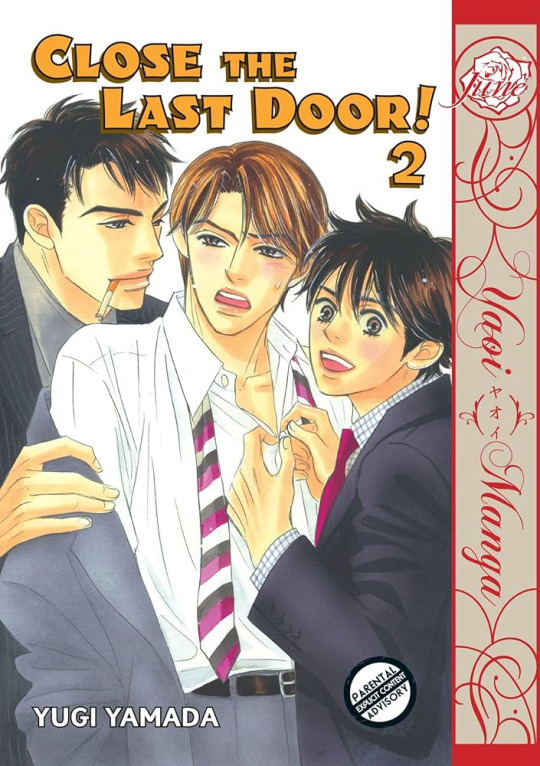
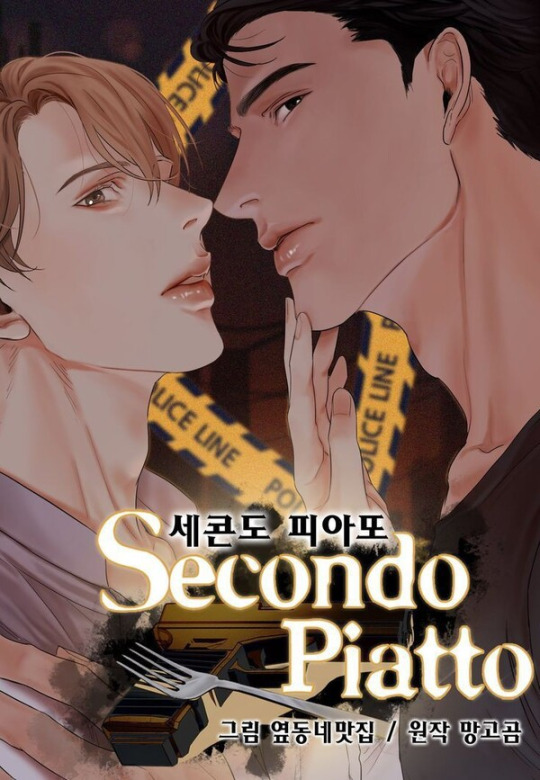
I used to joke that every bl generation gets the "Banana Fish," and specifically the Yut Lung character, they deserve. Perhaps every generation also gets their own version of "Close the Last Door." It's an irresistible setup: the main character has an unrequited crush on his straight best friend, makes a mess of himself at the straight best friend's wedding, drunkenly hooks up with another (male) wedding guest who is in love with the bride, stuff happens, happy ending as the two leads learn to move on and love each other. In "Close the Last Door," it is Nagai who is in love with his younger, bubbly coworker Saitou. After the wedding, he finds himself ranting to Honda, who reveals that he was the bride's ex. They get drunk, sleep together, and begin a friends with benefits relationship that is complicated when the bride elopes with another man just one day into the honeymoon. In "Secondo Piatto," Hyunwook is forced to grapple with his childhood friend Heesun marrying his police academy classmate Minseok. At the wedding, he discovers that Minseok's childhood friend Wonyoung has been in love with Minseok this whole time, and, well, they get drunk, sleep together, and begin a friends with benefits relationship.
The similarities in premise (if not plot) between the two series makes it easy to pick out what could be genre (manga vs manhwa) or generational (early 2000s vs 2020) differences. "Close the Last Door" is guilty of many of the critiques one could lob against early 2000s bl as a genre. The characters deny being gay (or bisexual) and, if pressed, would likely describe themselves as only gay for each other (or, in the case of main character Nagai, gay for Saitou and a victim to a lethal combination of Honda and alcohol). The character designs are generic, the seme dark-haired and the uke blond (though not frail or weepy or feminine). Much sex happens while the two mains are intoxicated, and there is a sexual assault scene (but not between Nagai and Honda!). Nagai and Honda manage to bumble into pseudo-marriage and cohabitation without so much as a "what are we?" conversation, and even a year into their relationship are still unable to be honest about their feelings for each other to each other, much less to other people. The two women in the series (Saitou's ex-wife Remi and Nagai's ex-girlfriend Ryoko) are reduced to catalysts for the main (gay) romance, and Ryoko in particular can come off like a harpy (though Yamada Yugi can't help but imbue her with a feisty charm, the curse of a good author). There is even a spin-off featuring an incestuous relationship (!) between Honda's two older brothers, who appear in "Close the Last Door" volume 2 as confusing side characters if you did not read their dedicated volume.
In contrast, "Secondo Piatto" is enlightened, woke even, at least by 2025 standards. Wonyoung is openly gay and identifies as such, even to Minseok. Hyunwook begins the story self-conceptualizing as straight, but tries hard to grapple with his sexuality when he begins sleeping with Wonyoung regularly. The pressures of homophobia feature in "Secondo Piatto"; it is a story that definitely believes gay people are real, as opposed to just a function of the plot requiring two men to fall in love. Where Ryoko cannot move on from Nagai and also has an interrupted tryst with Honda, Heesun is steadfastly into Minseok and is perfectly correct about why she never married Hyunwook. She is a blameless, charming character whom you could hold nothing against. Hyunwook and Wonyoung talk openly about their relationship and negotiate their boundaries, while Nagai and Honda are petty, scrappy, and constantly allowing Saitou to upturn the fragile balance of their relationship. Hyunwook gets the "fully smitten top who would do anything for his partner" treatment. His yearning is explicit, emotionally healthy, and mature, full of demonstrations of his commitment to Wonyoung and his explicit, emotionally healthy expectations for what a relationship with him would look like. Honda, on the other hand, tolerates Nagai's antics until they both reach a breaking point, after which he has a mental breakdown where he can barely express his feelings, gets embarrassed, and then gives Nagai a blowjob before sending Nagai back to deal with Saitou. I am not joking when I say this is how "Close the Last Door" volume one ends.
I grew up in a world where there weren't many bl dramas or movies and the biggest gay ships were largely noncanonical (even, as in the case of Supernatural, the noncanonical status became more and more strained). We called shipping two male characters in a noncanonical gay relationship "slash." This allowed us to differentiate it from yaoi or shounen-ai or boys' love/BL, where one could still ship a noncanonical relationship (the losing side of a love triangle, for example) but it would never be dismissed out of hand as impossible simply for being gay. Even after all these years, I am used to, even more comfortable, living in a space where I read canon against itself, where my pairing fights the story somehow, where every love story is by definition a struggle. I chafe at being handed an easy happy ending, even if I know that's the bargain I struck with the author when starting a story. I know, I know—I should probably be in therapy.
It is easy to see why Hyunwook and Wonyoung would fall for each other and end up together in "Secondo Piatto." Their romance is so very legible to the reader, the main takeaway of the story. Wonyoung yearns to be transformed into someone completely new who will fall in love with a completely new stranger, and together they will become two strangers who are in love with each other and have absolutely nothing to do with Wonyoung's past and Minseok. But love is honest, love is kind. Love means knowing and accepting the other for who they are, which is what Hyunwook offers. He sees Wonyoung, all of Wonyoung, and doesn't turn away. Minseok could never see Wonyoung as he really was—but then again, Wonyoung never let him. As for Hyunwook, he has to learn that love is something to fight for, instead of an inevitable reward you are given for standing silently by. You can learn lessons on healthy communication from "Secondo Piatto." It is a good manual for what to want in a relationship.
But what can we say about Honda and Nagai and "Close the Last Door?" They truly feel like two people who happened into a circumstance where they needed each other, who never dig themselves out of that hole. In a way, "Close the Last Door" has the air of the slash fanfic. You could easily see a world where there was some main canon featuring Saitou and his wife, and Yamada Yugi got it in her head to ship two side characters (Saitou's doting coworker and his wife's ex-boyfriend) and ended up writing a whole doujinshi about how they get together. They butt heads, they struggle, they seem to be fighting against the genre's expectation that they should end up together. Their happy ending is not the point, because it was never the plot. It is so besides the point that Yamada Yugi even keeps Saitou around for much, much longer than you would expect. After all, he has main character energy. By volume two, Saitou is fully a third wheel in the Nagai-Honda household, to the point where Yamada even pulls out the classic "if the two of us were dangling off a cliff, who would you save?" test. (The answer will delight you, if you're a sicko like me.)
Which is to say, I love "Close the Last Door." Don't get me wrong; I liked "Secondo Piatto" a lot too! The strength of Hyunwook and Wonyoung's interactions, their open communication with each other even in uncomfortable situations, made it a refreshing read, and there are some moments of such sharp writing about the weight of longing and codependency that I took many, many screenshots. But "Close the Last Door" is so messy, so human, so full of bad decisions and characters tolerating bad behavior from each other. Honda and Nagai argue and have sex and sometimes have sex while arguing and it makes me clap like a seal every time. If "Secondo Piatto" is about drawing boundaries, "Close the Last Door" is about greed and not having to confront your choices. Nagai wants everything. He wants to have his cake (be in a relationship with Honda) and to eat it too (love and pamper his idol Saitou). He does not want to put other people's feelings first. He doesn't want to have to choose, and above all, he doesn't want to admit to Saitou or Honda that he's chosen Honda.
This has always been Yamada Yugi's sweet spot: vivid, human characters who are messy and bad with their words, who never quite say "I love you" but who find ways to make themselves understood. In the world of Yamada Yugi, it is better, sometimes, to let things go unsaid. In Bonus Track 3 of "Close the Last Door" volume 2, Honda has to tell Nagai about his brothers. (This is literally Honda fulfilling his destiny of being a side character in another canon!) But through it all, he is vague and elliptical. "So they're really like that?" Nagai asks. "Probably, but I haven't confirmed it," Honda replies. His brothers' relationship is something Honda has never asked about, will never ask about, but fully understands. He begs Nagai to keep it a secret and act like he doesn't know.
In the conversation that follows, Nagai and Honda manage to say "I love you" over and over again, without actually saying anything of substance. And this is how the main story of "Close the Last Door" ends, with Nagai and Honda bickering and getting suckered into little jealousy games by Saitou and still bad at having an honest conversation with each other and still being so, so in love. Maybe that's toxic and a red flag in 2025. But "Close the Last Door" works for the same reason slash fanfic works, because its creator wrote a story just because she wanted to see these two particular characters in love. As Mary Oliver might say, you do not have to walk on your knees for a hundred miles to show you're a green flag or a world class yearner. Sometimes, it is enough to let these two characters love what they love, and that is each other.
"Close the Last Door" (and the spinoff "Open the Door to Your heart") was once upon a time licensed by DMP's imprint June. Some places still offer a way to buy the print versions. "Secondo Piatto" is available through Manta. I read the explicit version here.
8 notes
·
View notes